2nd round of study visit at IdISBA from the view point of Dr Simon, young researcher
Dr Péter Simon‘s invitation for the study visit covered the period between September 10, 2023 and October 6, 2023, Son in Mallorca at the IdISBa research center (Fundación Instituto de Investigación Sanitaria Islas Baleares).
Pseudomonas aeruginosa bacteria is in the main focus of research of the institution in Mallorca, as this is one of the country’s important research sites and samples from the Iberian Peninsula also arrive here for further processing.
During the 4 weeks he spent on the island, he took part in theoretical and practical training, which he completed with hard work. He was also able to join the research work, in which framework the bacterial resistance and changes in virulence factors were also investigated. During the study trip, he had the opportunity to learn and practice every step of the whole genome sequencing from DNA extraction of bacteria to sequencing and bioinformatics analysis of results.
This knowledge transfer was very useful for him as he had not dealt with sequencing before. The use of bioinformatics tools related to the method was actually neither known for him before.He is sure this knowledge will greatly contribute to his professional work in the future.
Grant office visit of IdISBA by SU
Grant office visit of IdISBA by SU on 02 October 2023
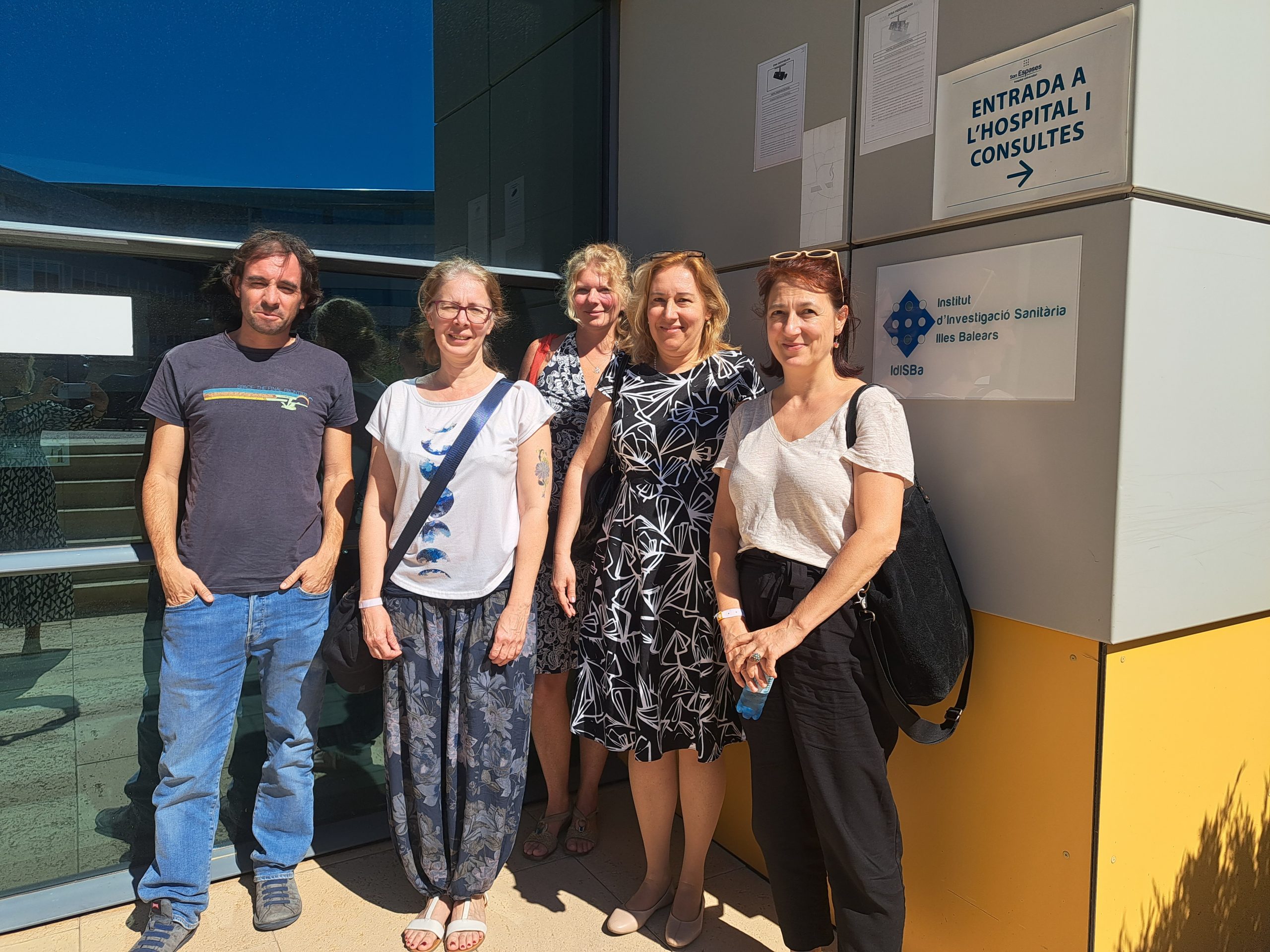 4 colleagues (Dr Dora Szabo, Orsolya Kotnyek, Patricia Merei, Paula Sarpatki) from SU visited the Grant office of Fundación Instituto de Investigación Sanitaria Illes Balears (IdISBa) on 02.10.2023 in Hospital Universitario Son Espases, Buiding “S”, 1st Floor.
4 colleagues (Dr Dora Szabo, Orsolya Kotnyek, Patricia Merei, Paula Sarpatki) from SU visited the Grant office of Fundación Instituto de Investigación Sanitaria Illes Balears (IdISBa) on 02.10.2023 in Hospital Universitario Son Espases, Buiding “S”, 1st Floor.
Antonio Oliver, Carla López, Elena Ferragut and Ernesto González-Robles welcomed the Hungarian group dealing with innovation and research management, then Elena and Ernesto introduced the operation of the International Projects Office OPI IdISBa. The main projects are collected.The parties were talking about the future proposals.
The negotiations continued with the meeting with Carlos Enrique from the Innovation Unit and Technological Transfer IdISBa. The parties were discussing about the activities of the innovation unit with special focus on IPR protection, establishment of spin-offs and their success on the market.
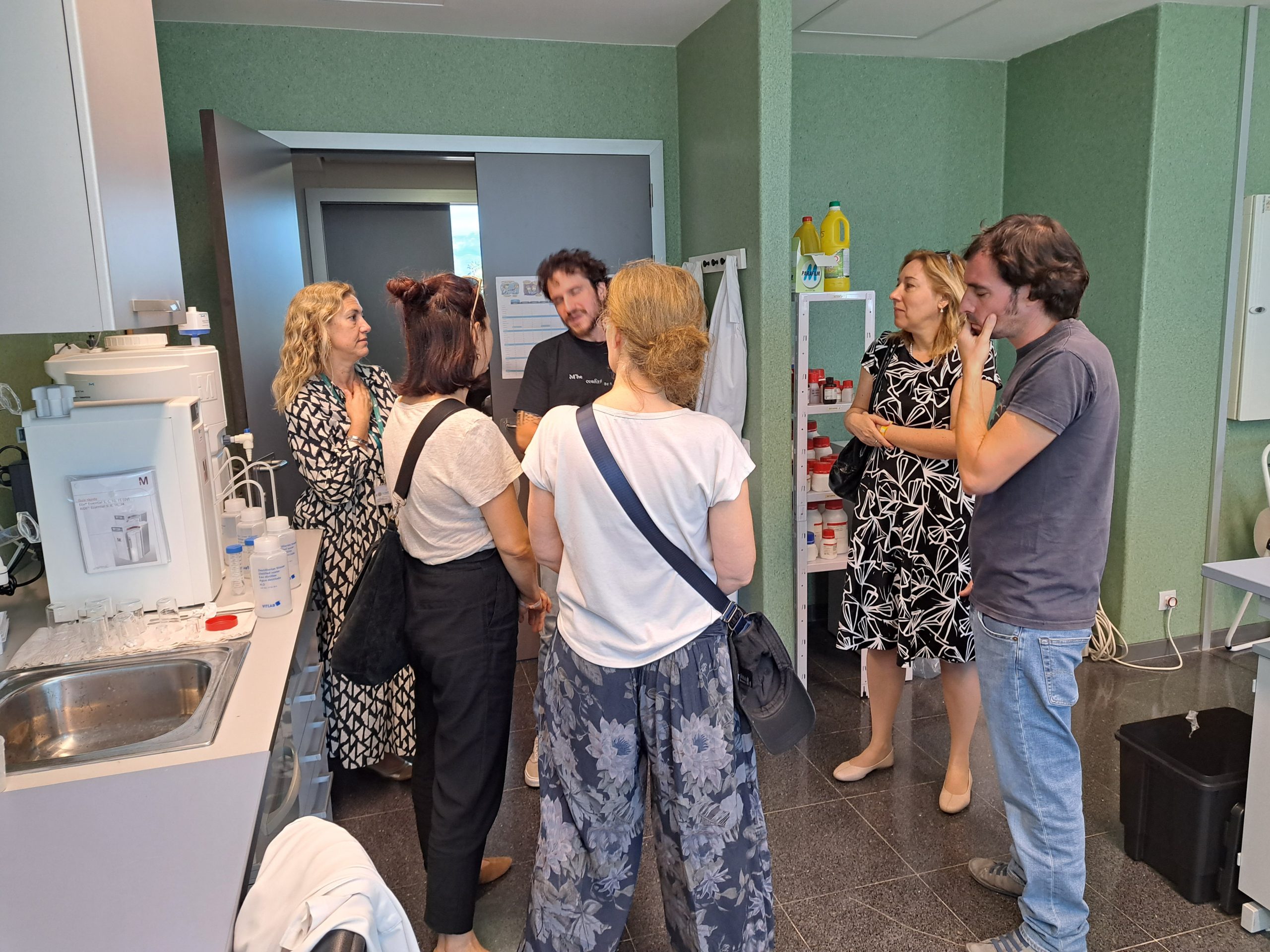 This session was followed by the visit of Microbiology Area Hospital Universitario Son Espases.
This session was followed by the visit of Microbiology Area Hospital Universitario Son Espases.
We agreed that the non-technical staff of IdISBA will also invited to the final meeting in order to get to know the corresponding Hungarian team of SU next March
Hands-on training and study visit of SU to IdISBA in September 2023
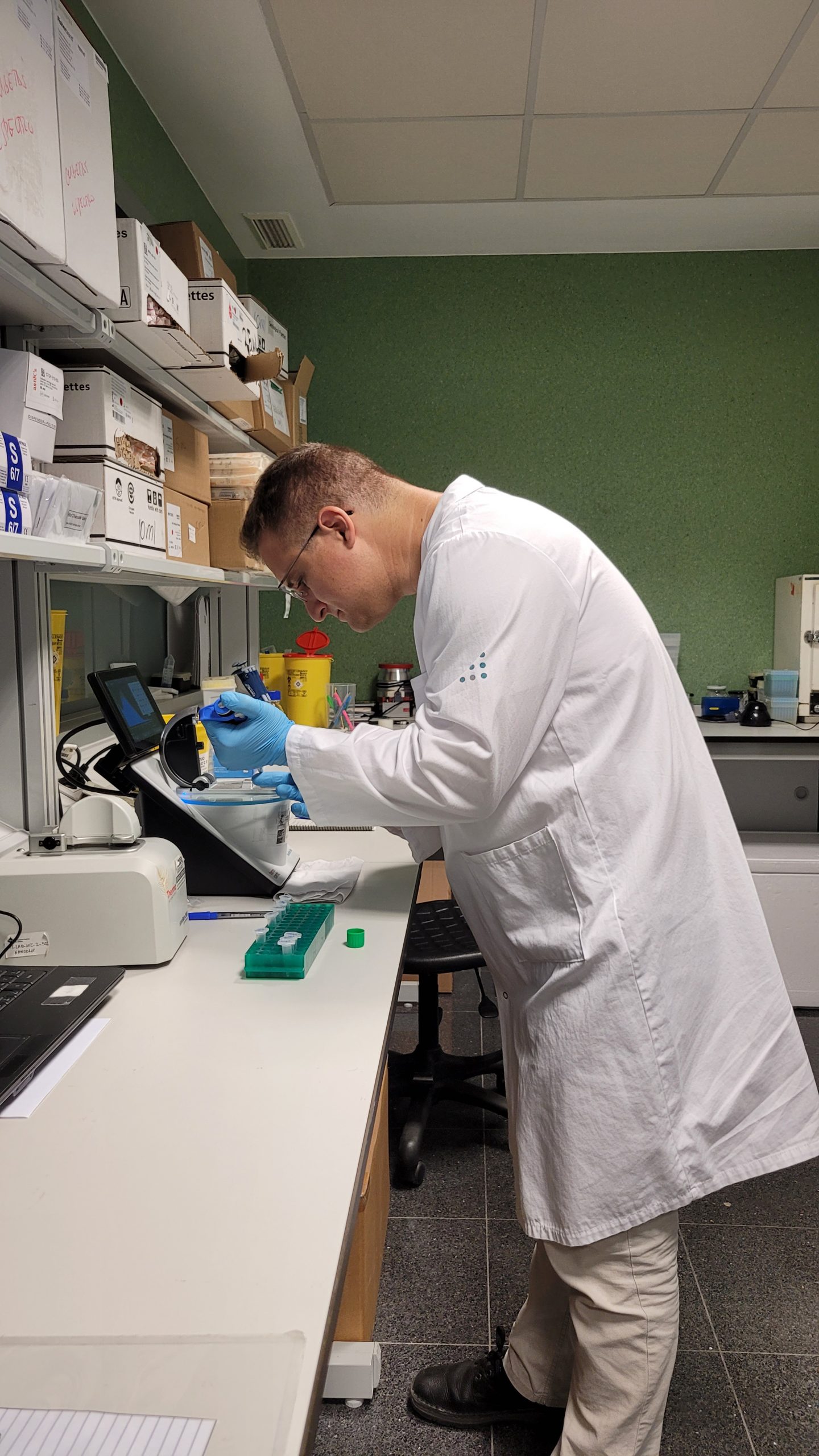 David Hummel Phd was invited to the Balearic Islands Health Research Institute (IdISBa) for the period 4-29 September 2023. During this period, he was able to participate alongside with Mate Gugolya Phd in an intensive, hands-on training on resistance and virulence factors of Pseudomonas aeruginosa bacteria from 4-8 September, which was of a very high quality and also useful.
David Hummel Phd was invited to the Balearic Islands Health Research Institute (IdISBa) for the period 4-29 September 2023. During this period, he was able to participate alongside with Mate Gugolya Phd in an intensive, hands-on training on resistance and virulence factors of Pseudomonas aeruginosa bacteria from 4-8 September, which was of a very high quality and also useful.
The Mallorcan institution has a high level and extensive research on P. aeruginosa and is one of the most important research sites in Spain, receiving clinical samples from all over the country.
During the study tour, David had the opportunity to learn all the steps of whole genome sequencing, giving him an insight into the whole process, from DNA extraction from bacteria to sequencing. It was extremely useful to see the whole process in one go. The bioinformatic analysis of the results were also introduced.
The take-away messages of UoB-EUniWell Visiting Fellowship
The take-away messages of UoB-EUniWell Visiting Fellowship for SU young researchers (July-August 2023)
Dr. Judit Sahin-Tóth shared here experience gained during the participation on the UoB-EUniWell Visiting Fellowship. Thanks to the fellowship alongside with 3 colleagues she spent a month at the University of Birmingham (UoB), in the Institute of Microbiology and Infection, School of Biosciences under the supervision of my host, Dr. Manuel Banzhaf.
The host, Dr. Manuel Banzhaf works as a group leader in the Institute for Microbiology and Infection at the University of Birmingham. His research explores the use of high-throughput approaches to phenotype pathogens. These methods allow him to study the bacterial cell envelope; and how differences in DNA sequences result in phenotypic variability of pathogens to improve antimicrobial treatment regimens. She learnt one of their laboratory techniques, with the help of Dr. Jack Bryant, research fellow. He explained the scientific background, and shared their protocol on a technique called TraDIS. TraDIS stands for Transposon Directed Insertion-site Sequencing, which is a powerful molecular genetics technique. It is primarily used to study the essential genes and gene functions in bacterial genomes.
TraDIS is a valuable tool for understanding gene function, identifying potential drug targets, and studying the biology of bacteria. It provides insights into which genes are crucial for a bacterium’s survival and growth in specific environments, aiding in the development of antimicrobial strategies.
Our young researchers also met up with Dr. Nicole Wheeler to talk about her field of expertise, which is AI and machine learning usage in microbiology. These techniques can be applied in various ways in bacteriology and epidemiology to enhance research, disease diagnosis and prevention. They discussed possible usage in disease prediction, surveillance and antibiotic stewardship. Machine learning is useful because it can analyze historical epidemiological data and environmental factors to predict disease outbreaks. This can aid in early intervention and resource allocation. AI-driven surveillance systems can monitor social media, news reports, and healthcare data to detect disease outbreaks or unusual patterns of symptoms in real-time. AI can also help healthcare providers make informed decisions about antibiotic prescriptions by analyzing patient data and recommending appropriate treatments. Machine learning can monitor antibiotic usage patterns and identify instances of overuse or misuse in healthcare facilities. Apart from these activities they also met up with some of the teaching staff of the School of Bioscence where Dr. Leanne Taylor-Smith, Dr. Julia Lodge, Dr. Scott White, and Sophie Hill discussed their curriculum and teaching methods for microbiology and they also took our researchers on a laboratory tour both in the labs of the School of Bioscience and in the Collaborative Teaching Laboratory of the university (https://www.birmingham.ac.uk/facilities/collaborative-teaching-laboratory/ctl.aspx). They also had the chance to discusse quality assurance processes with Dr. Debbie Cunningham
Study visit completed successfully between SU and UANTWERP
Another round of study visit completed successfully between SU and UANTWERP (June 2023)
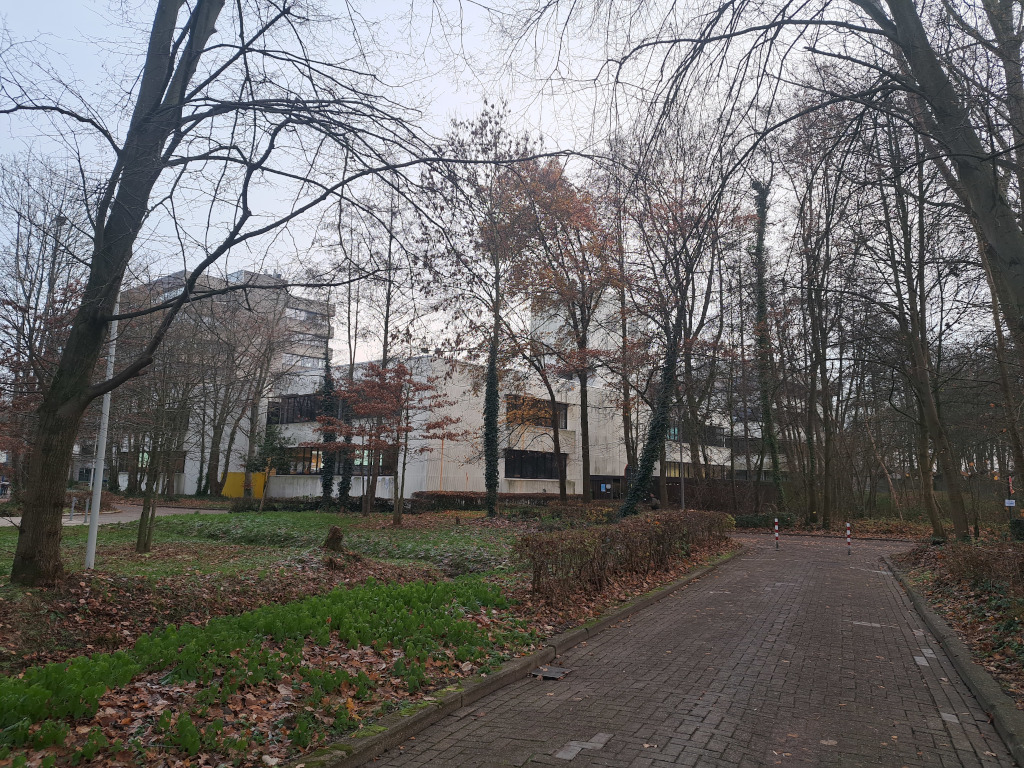 Between 4 and 30 June 2023, we, David Hummel PhD with János Juhász PhD of SU, worked together as visiting researchers at the Microbiology Laboratory of the University of Antwerp. The focus of our research was the analysis of whole-genome sequences of invasive clinical Acinetobacter baumannii isolates of Budapest origin. We were assisted in this by BacPipe, an integrated, user-friendly program developed by staff of the local institute, which speeds up and facilitates simultaneous searches in multiple databases. In addition to resistance factors, a thorough search for virulence factors was carried out and the ST and cgMLST types present were identified. These results will allow us to identify clonal complexes specific to the bacterial species and to place the samples studied in a European perspective. We are planning to publish our results soon.
Between 4 and 30 June 2023, we, David Hummel PhD with János Juhász PhD of SU, worked together as visiting researchers at the Microbiology Laboratory of the University of Antwerp. The focus of our research was the analysis of whole-genome sequences of invasive clinical Acinetobacter baumannii isolates of Budapest origin. We were assisted in this by BacPipe, an integrated, user-friendly program developed by staff of the local institute, which speeds up and facilitates simultaneous searches in multiple databases. In addition to resistance factors, a thorough search for virulence factors was carried out and the ST and cgMLST types present were identified. These results will allow us to identify clonal complexes specific to the bacterial species and to place the samples studied in a European perspective. We are planning to publish our results soon.
4 young researchers were granted with the UoB-EUniWell Visiting Fellowship
4 young researchers of Institute of Medical Microbiology of SU were granted with the UoB-EUniWell Visiting Fellowship which made it possible for our team to spend a month (Aug. 2023) at the University of Birmingham (UoB), in the Institute of Microbiology and Infection, School of Biosciences under the supervision of my host, Dr. Manuel Banzhaf.
The host, Dr. Manuel Banzhaf works as a group leader in the Institute for Microbiology and Infection at the University of Birmingham. His research explores the use of high-throughput approaches to phenotype pathogens. These methods allow him to study the bacterial cell envelope; and how differences in DNA sequences result in phenotypic variability of pathogens to improve antimicrobial treatment regimens.
Dr. Jack Bryant, research fellow explained the scientific background, and shared their protocol on a technique called TraDIS. TraDIS stands for Transposon Directed Insertion-site Sequencing, which is a powerful molecular genetics technique. It is primarily used to study the essential genes and gene functions in bacterial genomes. Here’s how TraDIS works:
- Transposon Insertion: In TraDIS, a transposon (a DNA sequence that can move around within the genome) is randomly inserted into the bacterial genome. This insertion disrupts the function of the gene where it lands in.
- Growth and Sequencing: The modified bacteria are then allowed to grow under specific conditions. The transposon insertions that cause a disadvantage to bacterial growth under those conditions will be less likely to survive.
- Sequencing: The surviving bacteria are harvested, and their DNA is sequenced. This sequencing allows researchers to identify the locations where the transposon inserted itself in the genome.
- Data Analysis: By analyzing the sequencing data, researchers can determine which genes are essential for bacterial growth under the conditions tested. Genes that are disrupted by transposon insertions and cause a growth disadvantage are likely to be important for the bacterium under those conditions. TraDIS is a valuable tool for understanding gene function, identifying potential drug targets, and studying the biology of bacteria. It provides insights into which genes are crucial for a bacterium’s survival and growth in specific environments, aiding in the development of antimicrobial strategies.
Dr. Nicole Wheeler detailed her field of expertise, which is AI and machine learning usage in microbiology. These techniques can be applied in various ways in bacteriology and epidemiology to enhance research, disease diagnosis and prevention. We discussed possible usage in disease prediction, surveillance and antibiotic stewardship.
We were also taken to a laboratory tour both in the labs of the School of Bioscience and in the Collaborative Teaching Laboratory of the university (https://www.birmingham.ac.uk/facilities/collaborative-teaching-laboratory/ctl.aspx). We also had the chance to discuss quality assurance processes with Dr. Debbie Cunningham. We also enlighten them about the mission of AmReSu project and agreed to submit common research proposals under Horizon Europe.
AmReSu Summer School
The AmReSu consortium organised its Summer School in Budapest, Hungary between July 3rd and July 7th. The speakers included colleagues from UAntwerp, IdISBa, BFM and SU, also life science and health care companies, research institutions were invited as presenters (See the agenda for more details). The AmReSu Summer School was held as a hybrid event, the invited audience could join online and on-site to participate in the lectures. The program itself was a huge success, several PhD students and a lot of university staff participated.
The last two days also included practical sessions: On Tuesday the participants could join a wet lab session about sequencing techniques and WGS and on Friday the audience could work with visualization tools used in metagenomics and whole genome sequence analysis.
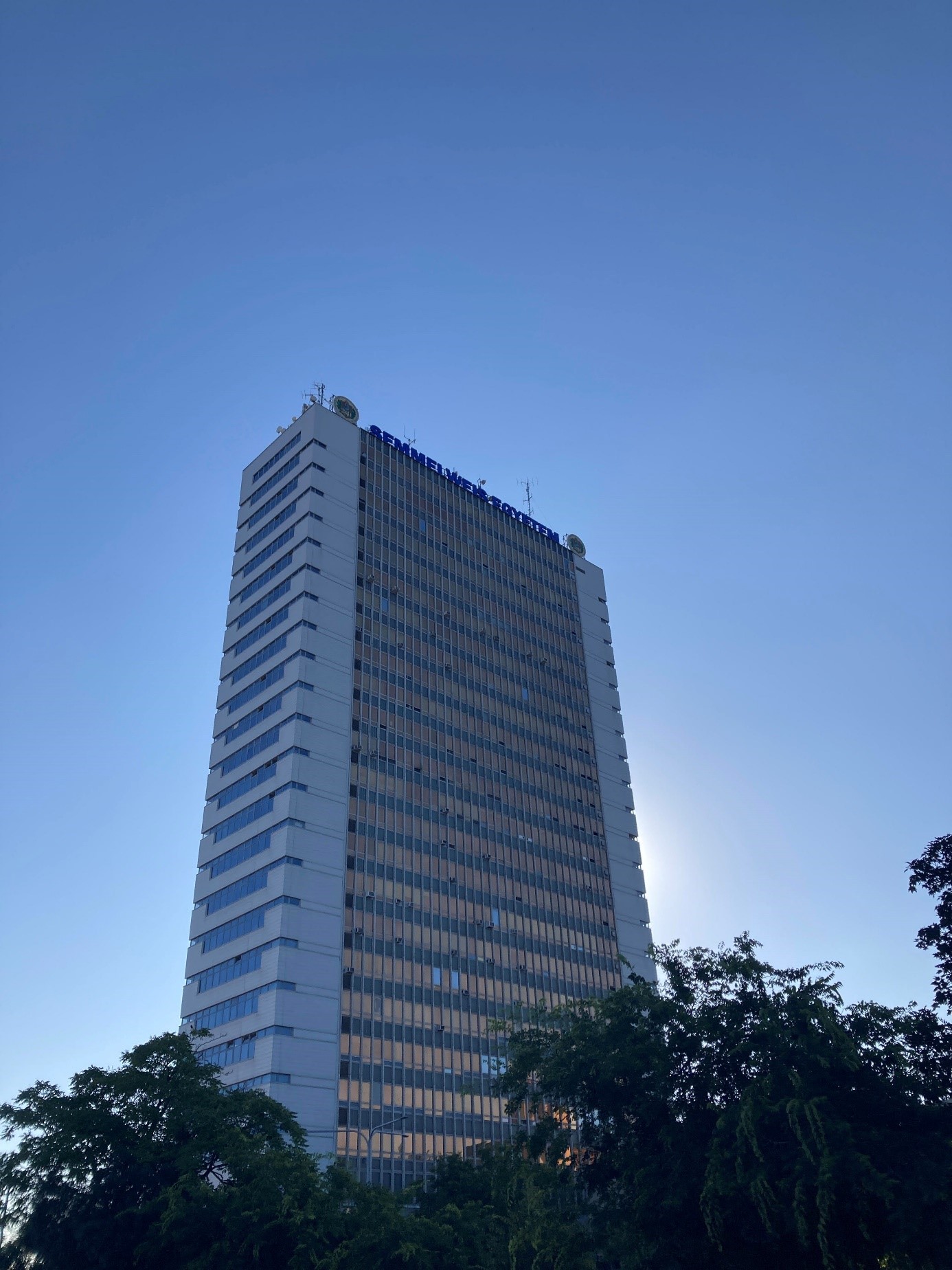
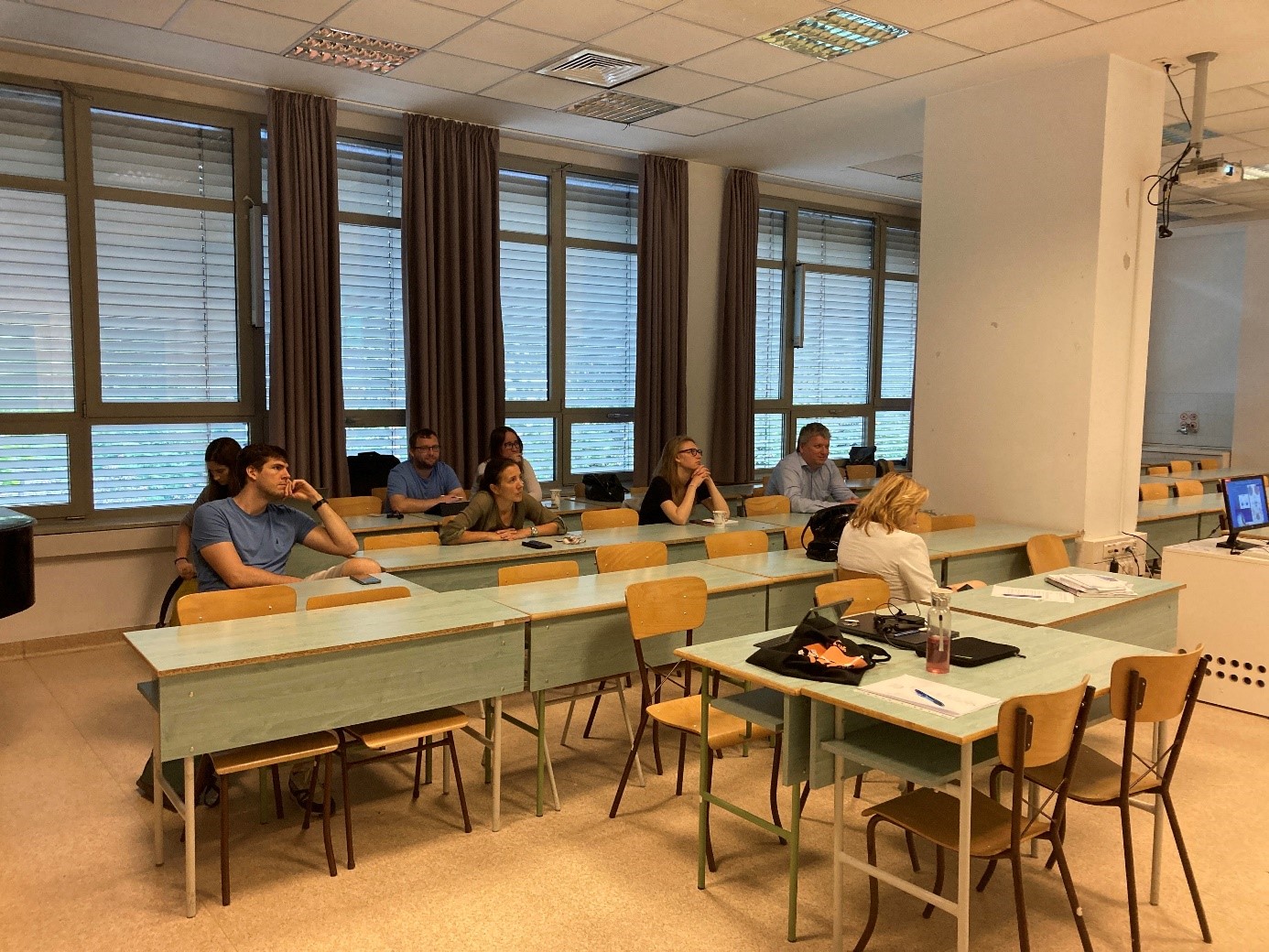
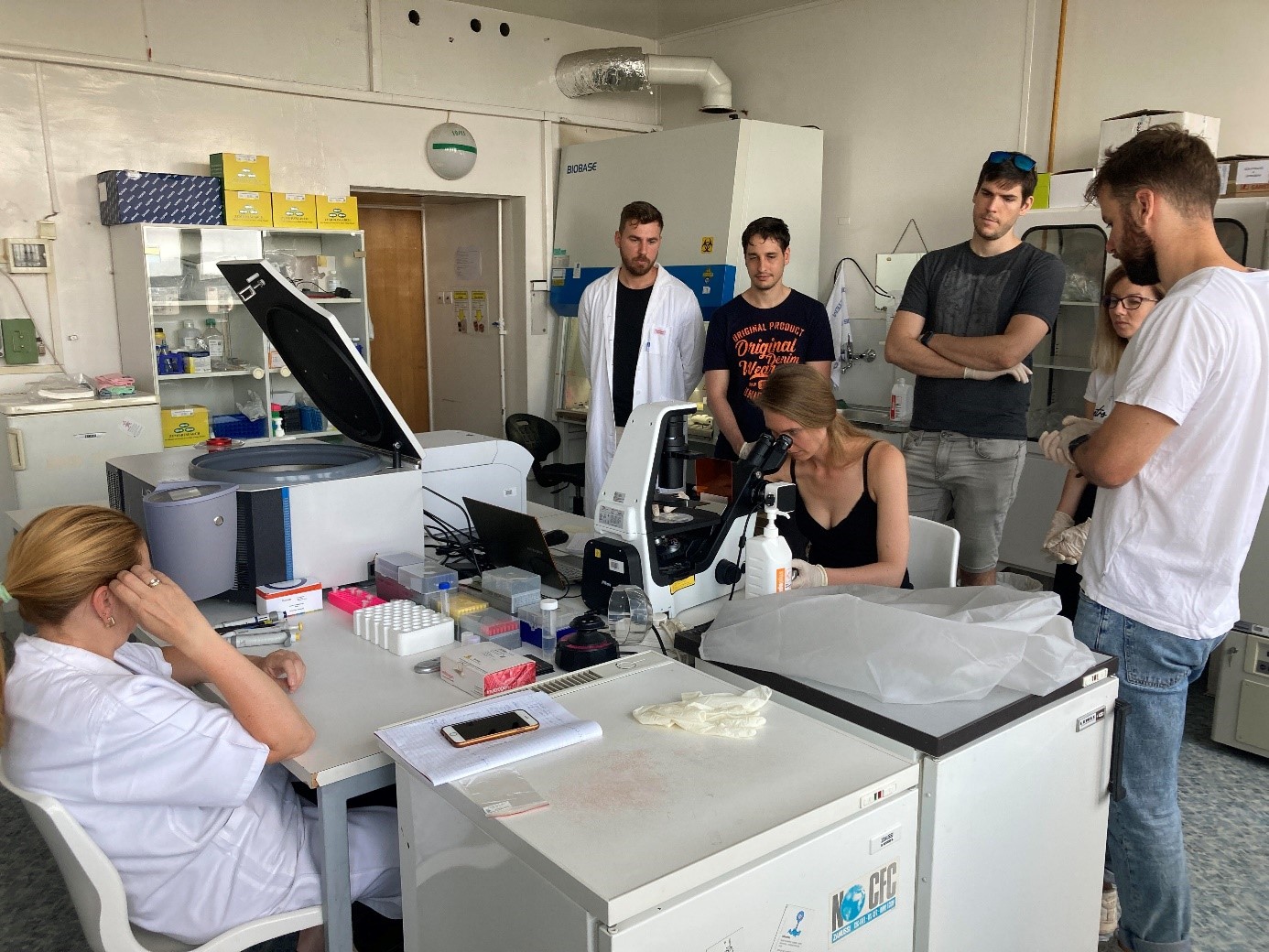
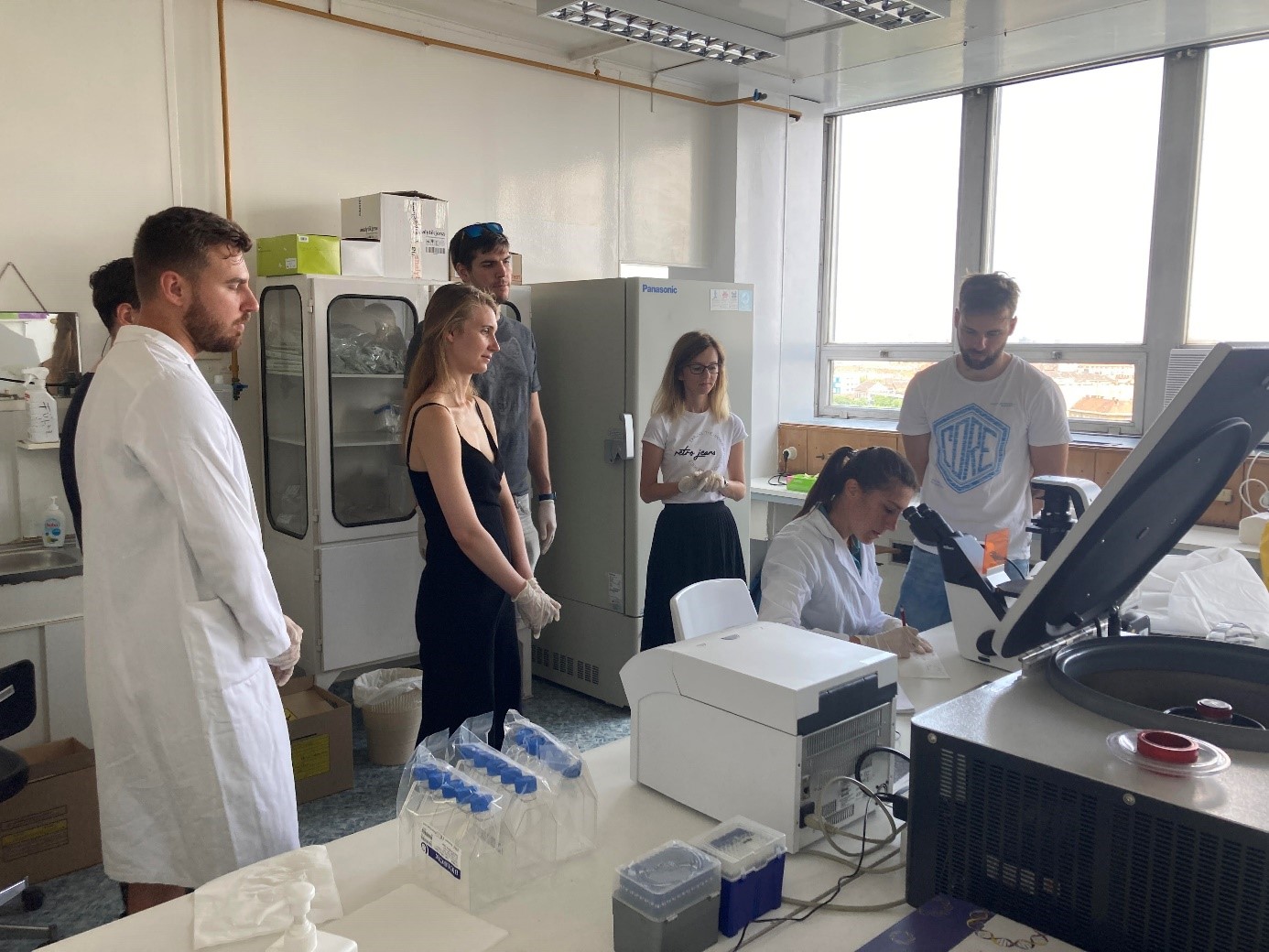
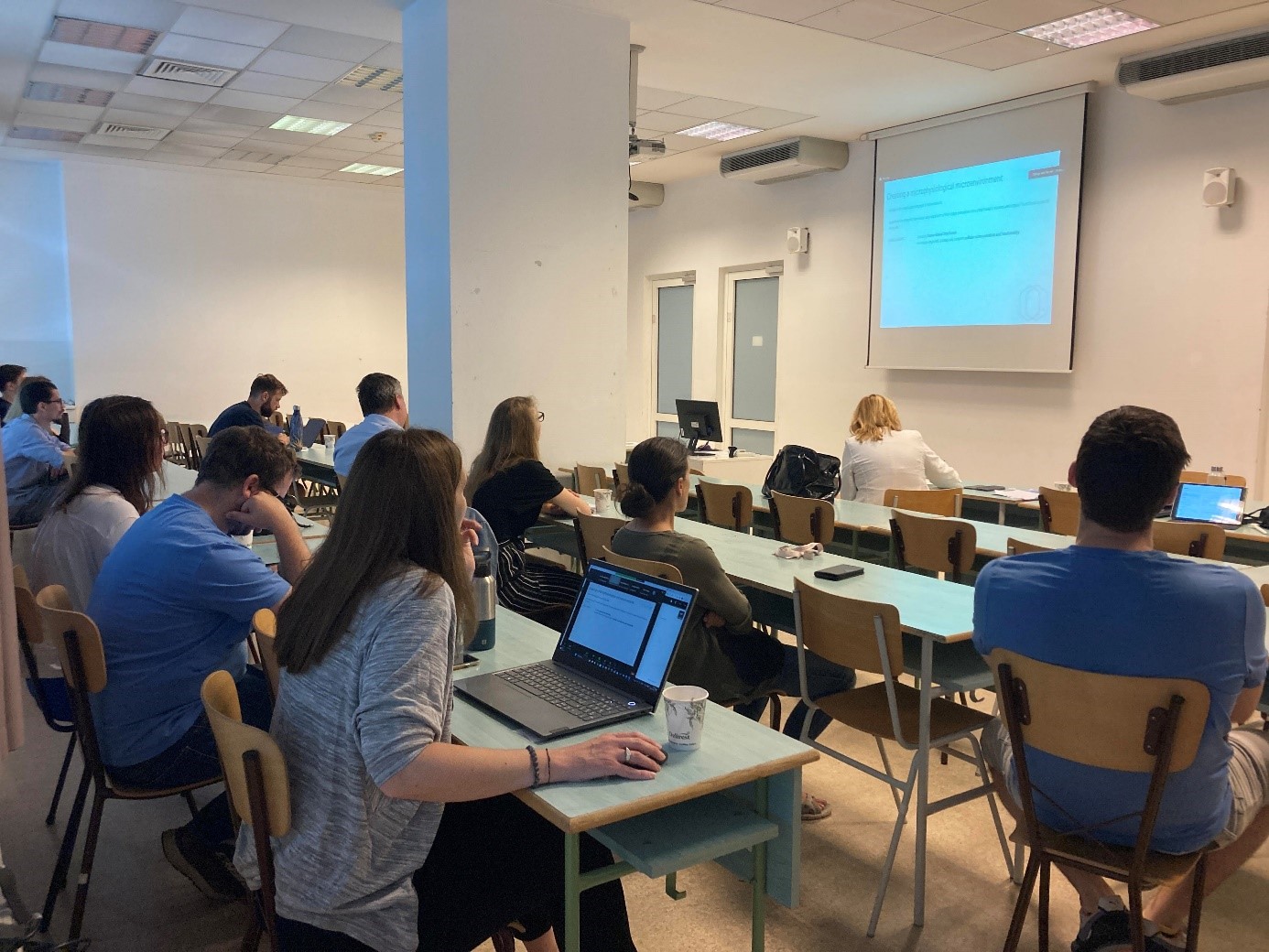
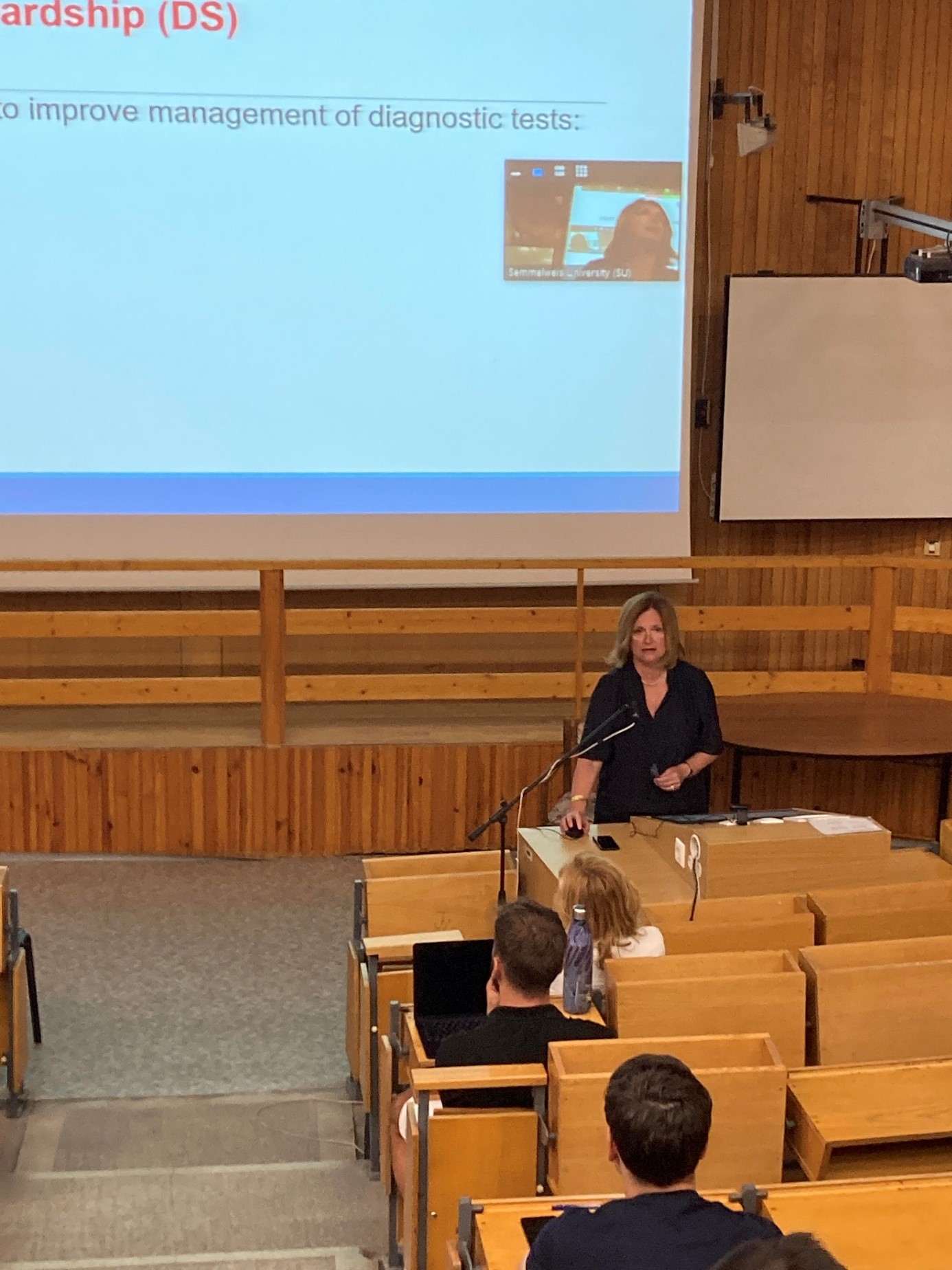
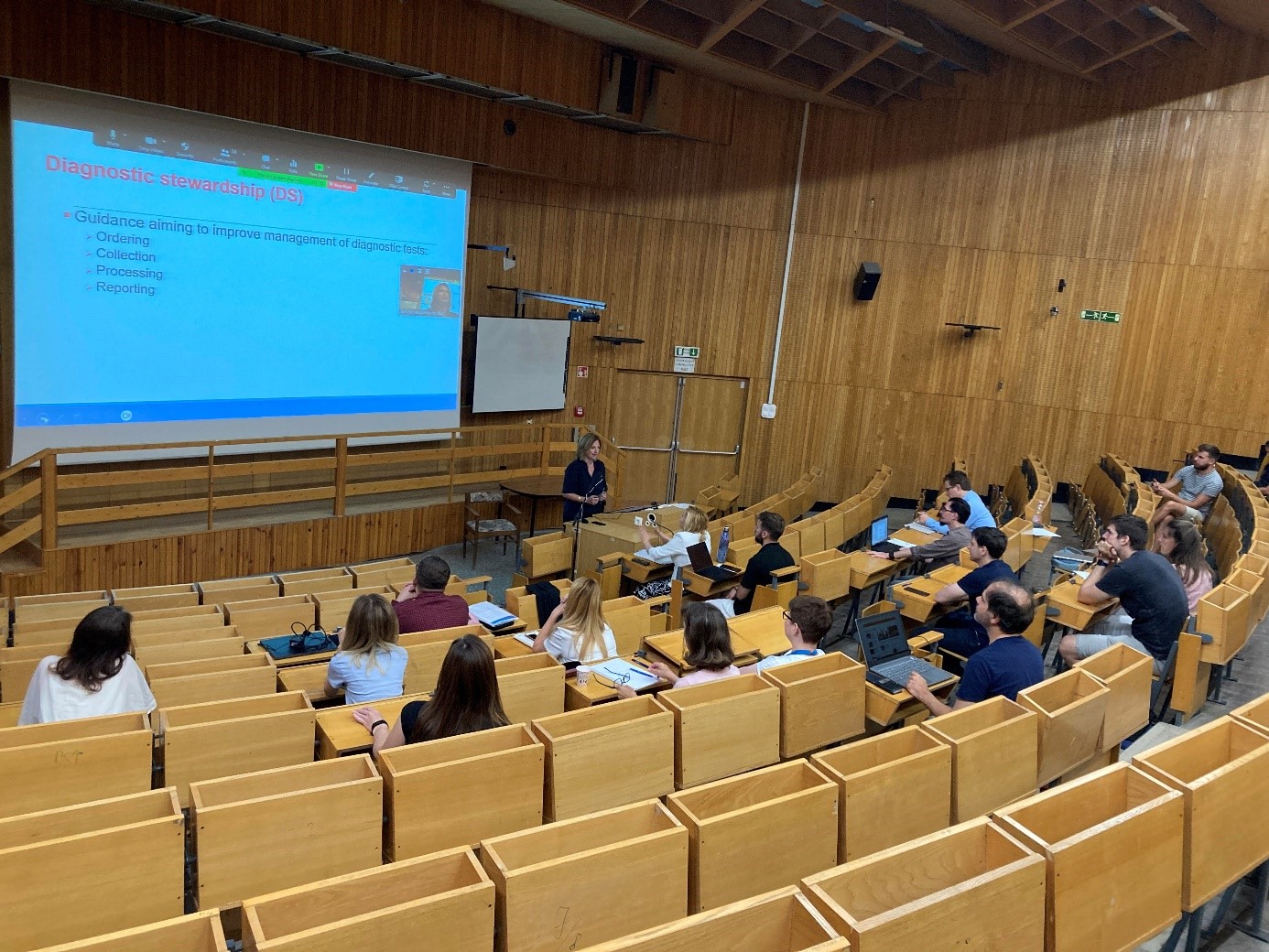
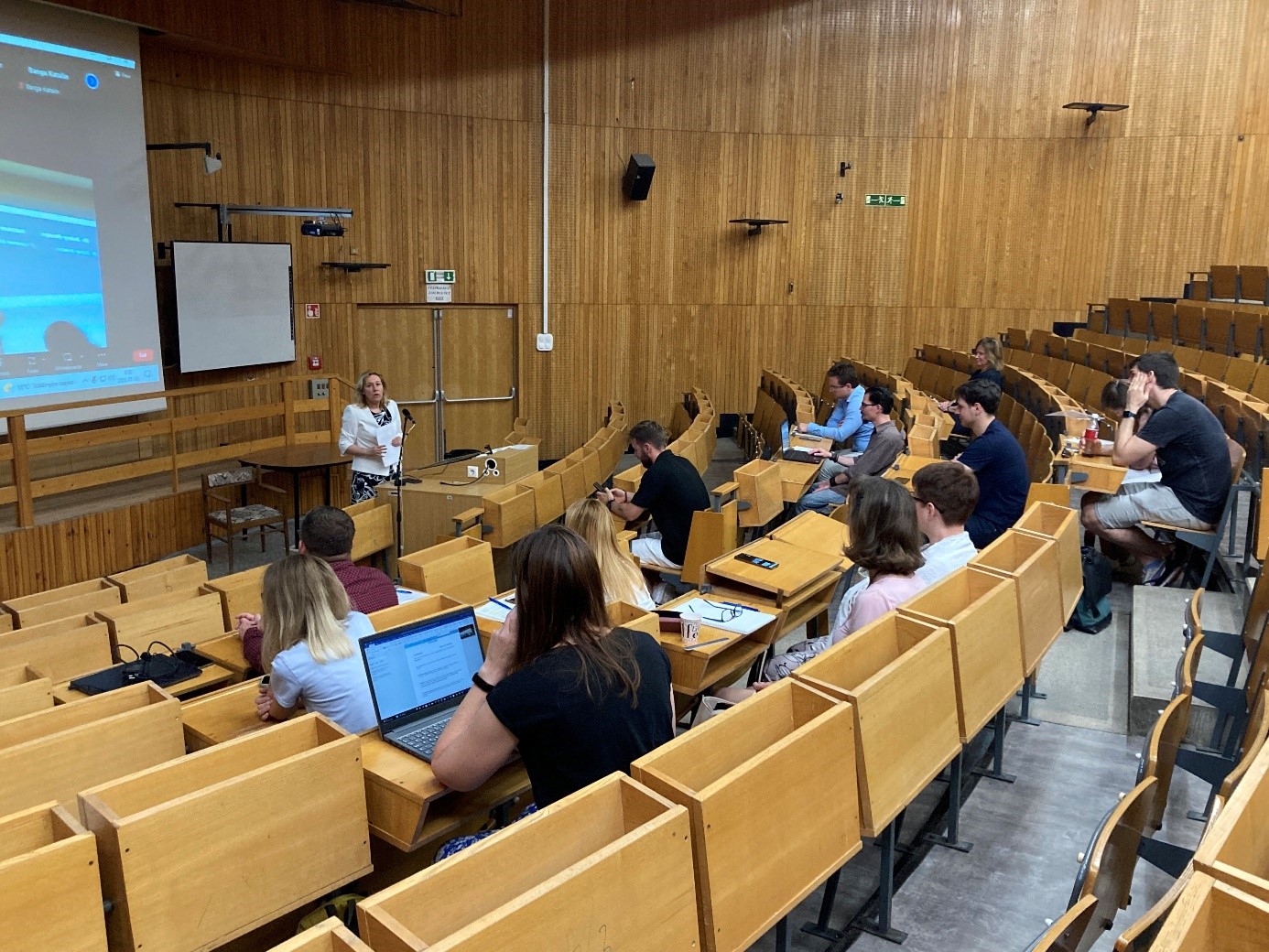
BIONNALE 2023
BIONNALE 2023 is the biggest networking event for life sciences and healthcare industries in the German capital region.
When? Tuesday and Wednesday, 16-17 May 2023
Where? BIONNALE 2023 will be an onsite (16 May 2023) in Berlin and virtual (17 May 2023) event.
Location:
Ludwig Erhard Haus, Fasanenstraße 85.
10623 Berlin
Who will be attending?
Companies and research institutions from the region and beyond looking for co-development or joint research opportunities – Startups with new ideas and innovative approaches – Investors on the corporate, institutional and VC sides and other stakeholders.
Further info: https://bionnale2023.b2match.io/
One PhD student from BFM went to IdISBa for four weeks during March 2023.
One PhD student from BFM went to IdISBa for four weeks during March 2023. The purpose of the staff exchange was to work with experts in the field of genomics and learn new techniques and methodologies to advance BFMs research capacity. During the one-month visit, one PhD student from BFM had the opportunity to collaborate with researchers and attend seminars that provided valuable insights and expertise in the specific area of research.
The main goal of this study visit was to conduct the experiment and to analyze the genomic data regarding the resistome of Pseudomonas aeruginosa. Mentoring activities were carried out during the whole month to provide one student with knowledge on how to perform the complete experiment – from laboratory part to bioinformatic analysis. Obtained data from this visit will be part of joint publication for both BFM and IdISBa.
The activities carried out all through are explained week by week at the Activity Plan Description.
Activity Plan Description:
1st week: Wet Lab
In the first week of the visit, 84 bacterial strains were evenly distributed over the surface of an agar plate medium using spread plate method. The starting material for downstream analysis were bacterial colonies which were growing on the agar plate.
- A few colonies were scraped from the agar plates and genomic DNA was extracted
- Absorbance test was used to assess the purity of the DNA
- Using fluorometric methods the quantity of DNA was measured
- Extracted DNA was used to construct the genomic library
Furthermore, antimicrobial susceptibility testing (AST) was performed to determine which antimicrobials inhibit the growth of the bacteria and to be able to later correlate phenotypic results with genomics results.
- Minimum Inhibitory Concentration (MIC) test was used to determine the lowest concentration of an antimicrobial agent needed to inhibit visible in-vitro growth of a Pseudomonas aeruginosa
2nd week: Wet Lab
In the following week, one student from BFM (with the mentoring help from IdISBa) constructed genomic library using the DNA Prep Illumina reference guide. Additionally, strains were sequenced using Illumina MiSeq systems.
- Construction of genomic libraries
- Performing whole genome sequencing for all analyzed strains
3rd week: Dry Lab
During this week, researcher from BFM started with the data analysis for all the samples:
- Quality check of the obtained raw fastq data
- De novo assembly of the reads
- Analysis of Multi Locus Sequencing Typing (MLST)
- Study of the acquired resistance determinants using ResFinder tool
4th week: Dry Lab
The fourth week of the stay was reserved for further data analysis and for discussion with experts in the field of study.
- Identification of the variants from sequence data – variant calling analysis
- Mapping reads to reference genome to detect large indels in genome
- Discussing the obtained data with mentors from IdISBa
- Writing the results of the study
Discussing about future perspectives of this study visit
AmReSu meeting and X. antibiotic susceptibility testing course
AmReSu consortium held its M29 project meeting in Zagreb, Croatia on February 23, 2023. During the meeting the partners discussed the progress of each work packages and the activities in the coming months. The industrial relationship will be focused in spring. There will be dedicated industry-academy workshop held to the Hungarian industrial players and the widening partners will continue to have agreements with stakeholders with interest in the project topics. Upon the project results some common studies/publication are planned to prepare between the partners. The publications will be finalised during the staff exchanges scheduled by May-June and September at the western partners: UAntwerp and IdISBA. The partners have also discussed the topics of the Summer School at SU in early July 2023 and the hands-on workshop at IdISBA in September 2023.
4 young researchers of Semmelweis University attended the X. antibiotic susceptibility testing course – the role of diagnostic and antimicrobial stewardship course organised by AmReSu project partner, BFM in Zagreb, Croatia. The course was held on 23 -24 February 2023. Our coordinator of AmReSu, Dr. Dora Szabo, SU gave also a speech entitled “The role of WGS in antibiotic resistance surveillance“.
The detailed agenda is found below. The participants considered the event very interesting in topic wise and useful, thanks to the opportunity of direct networking with Croatian stakeholders and the experts of the mentoring IdISBA and Uantwerp.
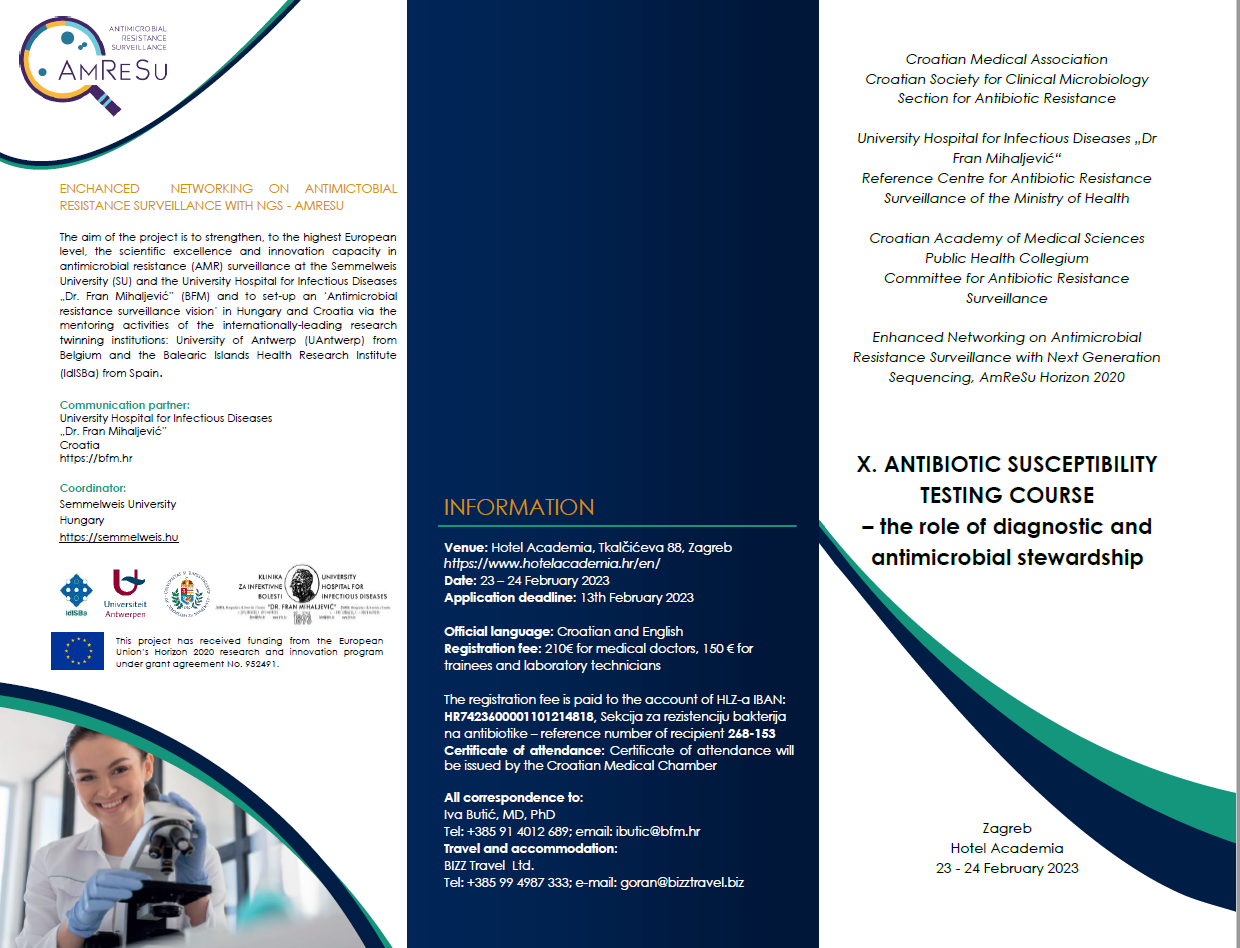
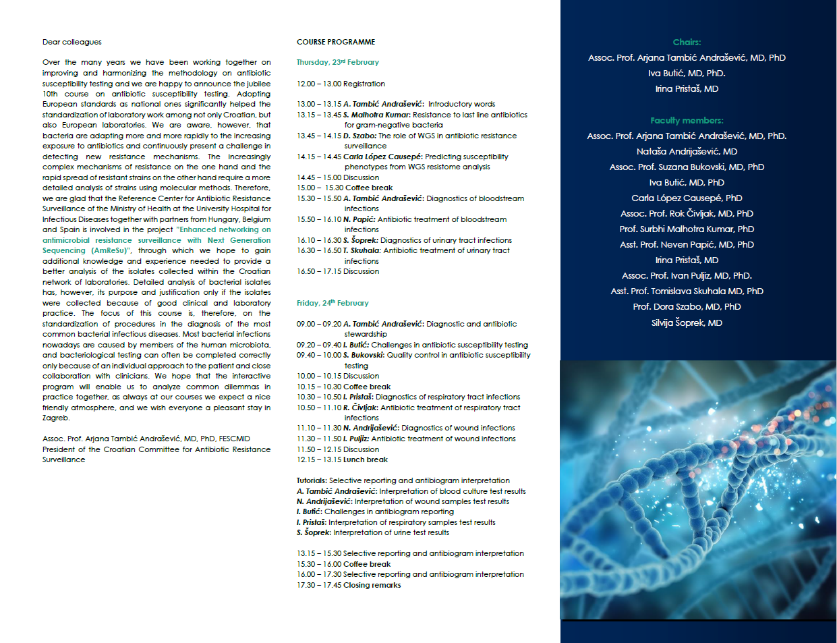
AmReSu meeting and clinical application workshop
December 2022 Anwerp, Belgium
In December 2022, project partners from Antwerp organized AmReSu meeting and clinical application workshop which was held at the University of Antwerp.
All project partners attended the meeting, and they discussed plans for the next year of the project. Afterwards, two sessions were also organized relating to “clinical application workshop” and “research management, administration and entrepreneurial skill development”.
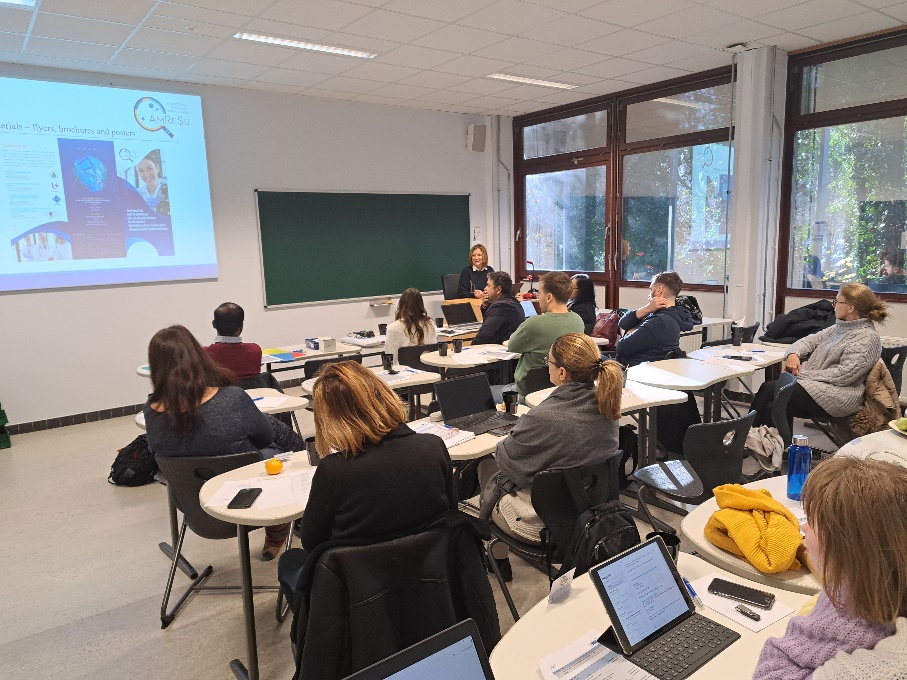
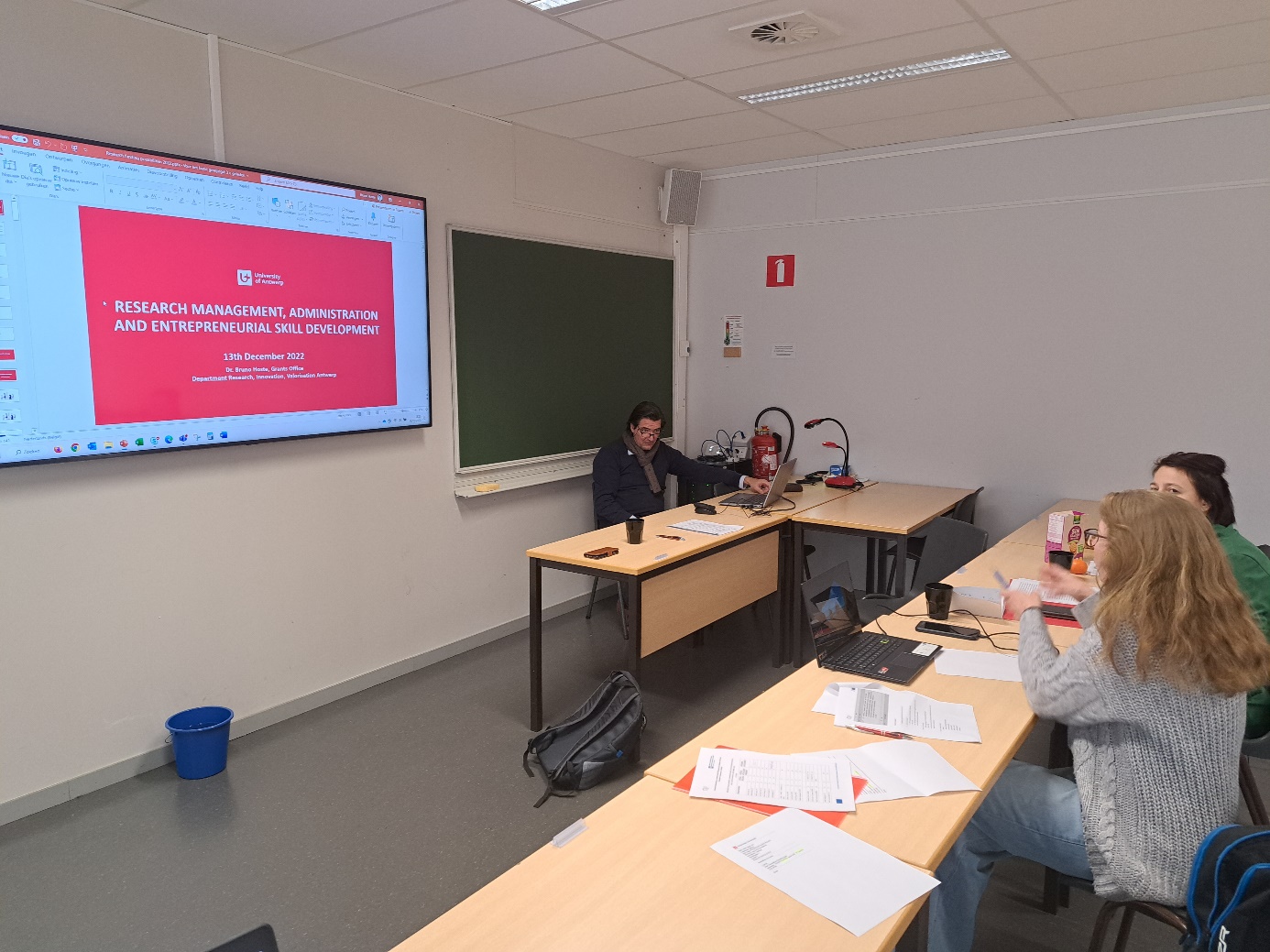
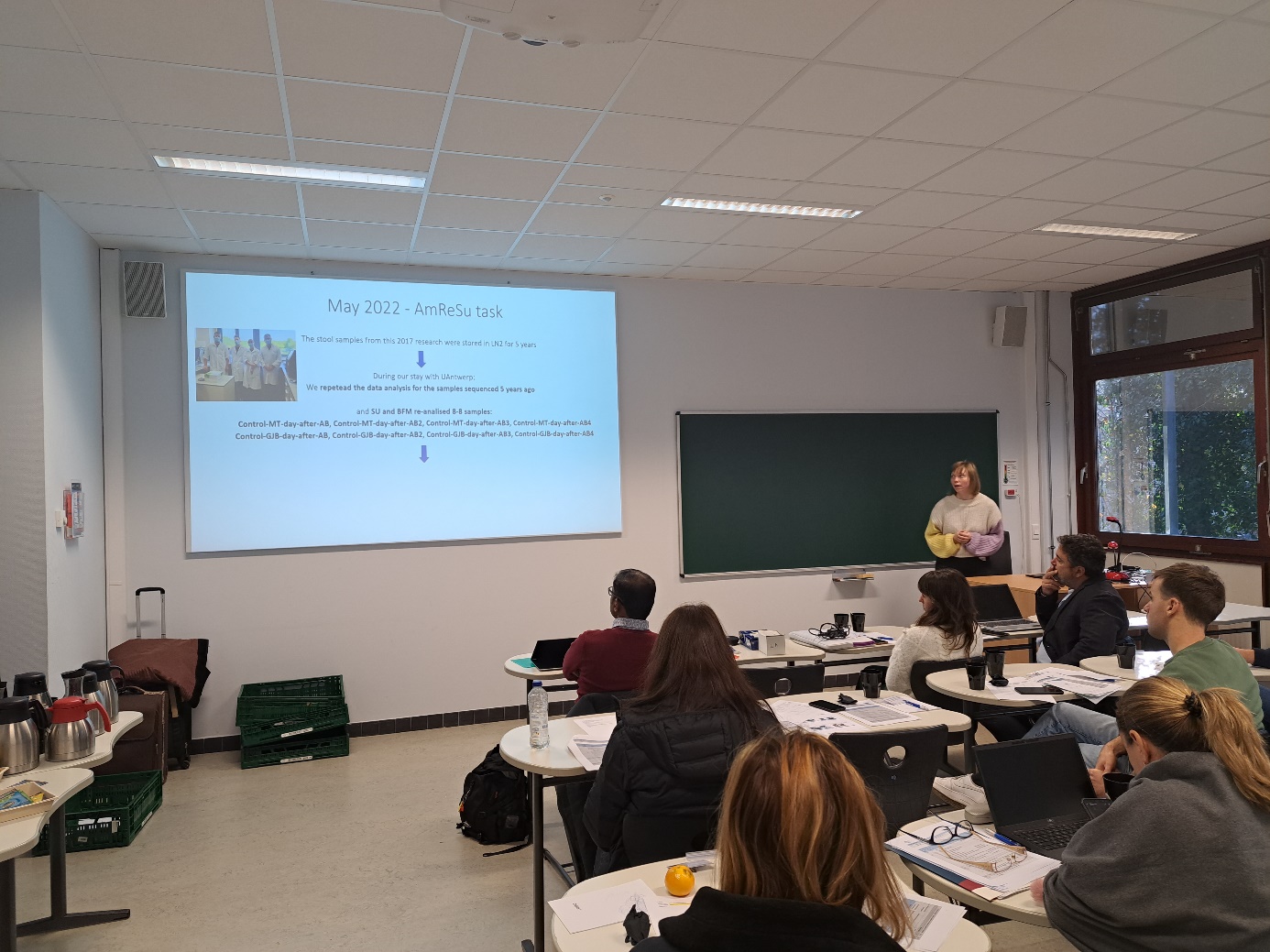
40TH ANNIVERSARY OF INTERNATIONAL MEDICAL EDUCATION AT SEMMELWEIS UNIVERSITY
November 07-09, 2022
Semmelweis University, Basic Medical Science Center, Budapest, Hungary
Semmelweis Symposium is the most prestigious annual scientific event of Semmelweis University, which presents the latest scientific results and innovations and is an excellent forum for international knowledge transfer and networking.
The scientific program of the 2022 Semmelweis Symposium was organized around the 40th anniversary of international medical education at Semmelweis University covering a wide range of topics.
Keynote lectures were be held by internationally recognised experts, alumni and esteemed collaborators of Semmelweis University. Sessions and posters on new trends in medicine, dentistry, pharmaceutical and health sciences were being to provide an unforgettable scientific experience. The young researchers of SU exhibited 2 posters related to project results.
M22 PROJECT MEETING and Capacity building seminars were held on 06-08 July 2022 at SU in BUDAPEST, HUNGARY
In July 2022, project partners from Hungary organized AmReSu meeting, and seminars related to burdens of AMR which was held at the University of Semmelweis. Most of the project partners attended the meeting in person, while some of them joined remotely, and they discussed plans for the next year of the project.
The program of the meeting: download
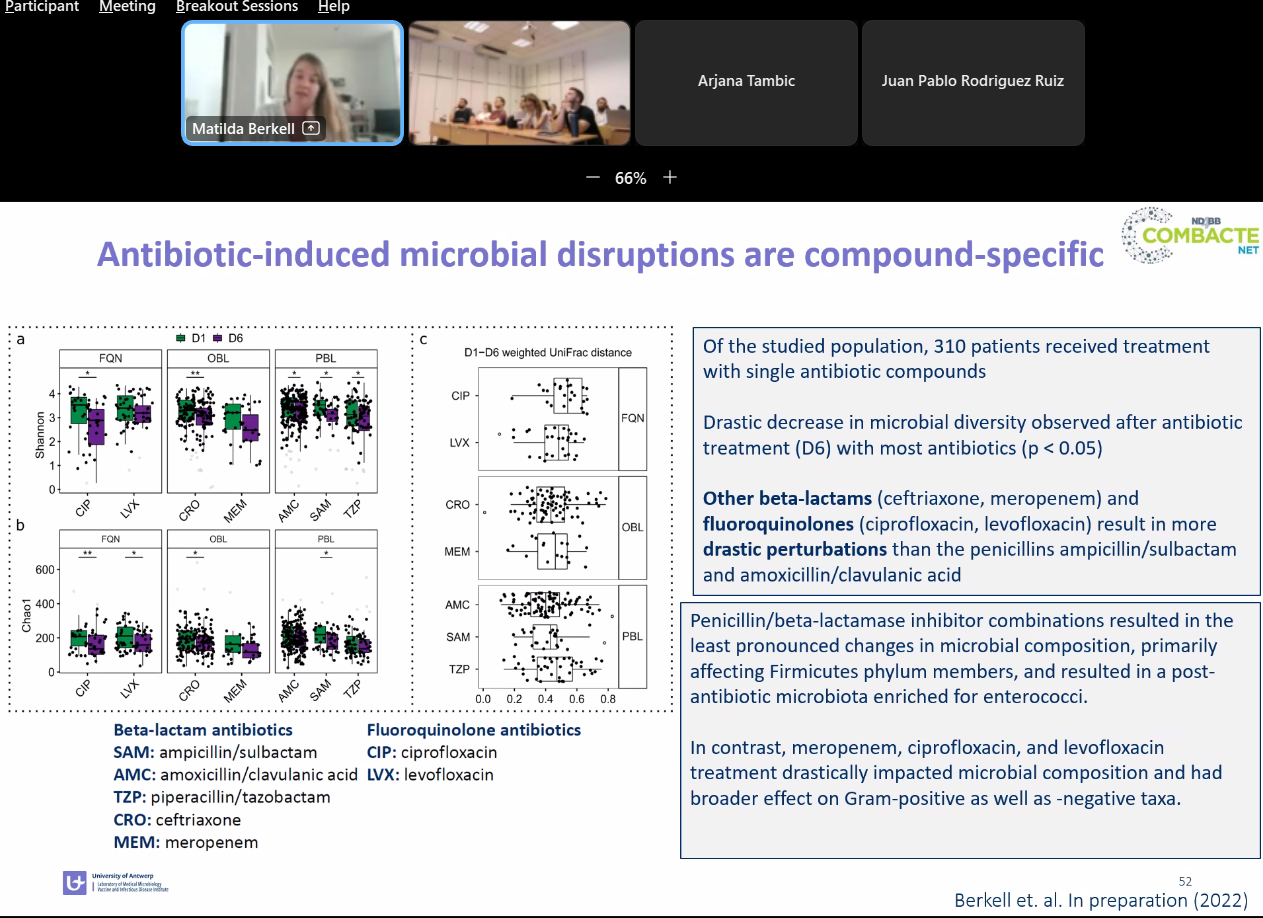
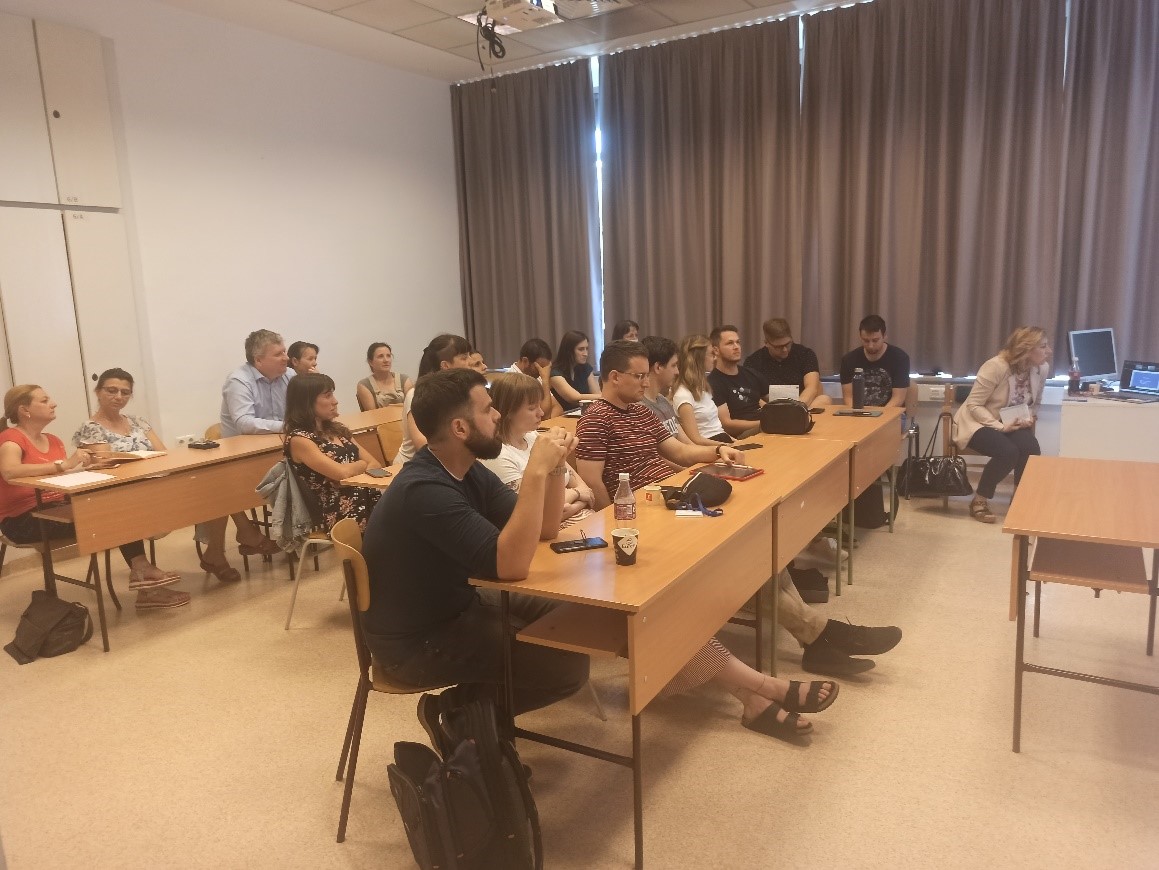
The partners agreed in the following action plan for the next year of the project:
- to organize knowledge sharing info forum at BFM about the staff exchange in July 2022
- to run bilateral talks about studies/publication in summer/autumn 2022
- to have consortium online meeting on the research proposals organized by SU in summer 2022
- to organize an industry-academy workshop at SU in Sept 2022
- to visit ESCMID PGEC Course in Sibenik: FM, SU, UAntwerp in October 2022
- to organise M26 PM meeting in Antwerp + grant office visit +clinical application workshop in November 2022
- to hold a soft-skill development training by IdISBA for SU+BFM in January – February 2023
- to organize M30 PM meeting at IdISBA + grant office visit March 2023
- to implement the 2nd round of student staff exchange (1-1 month) at UAnwerp and at IdISba in the agreed dates
- to run 1-week Summer School at SU in August 2023
- to run a hands-on workshop at IdISBA in September 2023
Croatian Society for Infectious Diseases and the Croatian Society of Clinical Microbiology – CROCMID 2022
20-23 October 2022 in Sibenik, Croatia
The AmReSu project was presented at the fourth joint congress of the Croatian Society for Infectious Diseases and the Croatian Society of Clinical Microbiology – CROCMID 2022 (13th Croatian Congress of Clinical Microbiology and 10th Croatian Congress on Infectious Diseases) with an international participation, which was held at Amadria Park Conference Center, Šibenik, Croatia, between 20 – 23 October 2022.This time CROCMID attracted more than 500 participants from 14 different countries. The aim of CROCMID 2022 was to exchange experiences and knowledge in the field of diagnostics, treatment, and prevention of infectious diseases and to connect physicians of different specialties and professions.
One of the main goals of the AmReSu is to disseminate knowledge related to antimicrobial resistance analysis. The Antimicrobial Section of CROCMID congress was a place where partners from University Hospital for Infectious Disease “Dr. Fran Mihaljević” had talked about the project experience. Both molecular biologists, Marko Jelić and Josip Ujević, gave speeches about the results of the twinning workshops, which were held in University of Antwerp and in The Health Research Institute of the Balearic Islands. Moreover, project partners Arjana Tambić-Andrašević, Iva Butić and Irina Pristaš actively participated at the conference and highlighted the importance of antimicrobial resistance which is one of the AmReSu project’s goals.
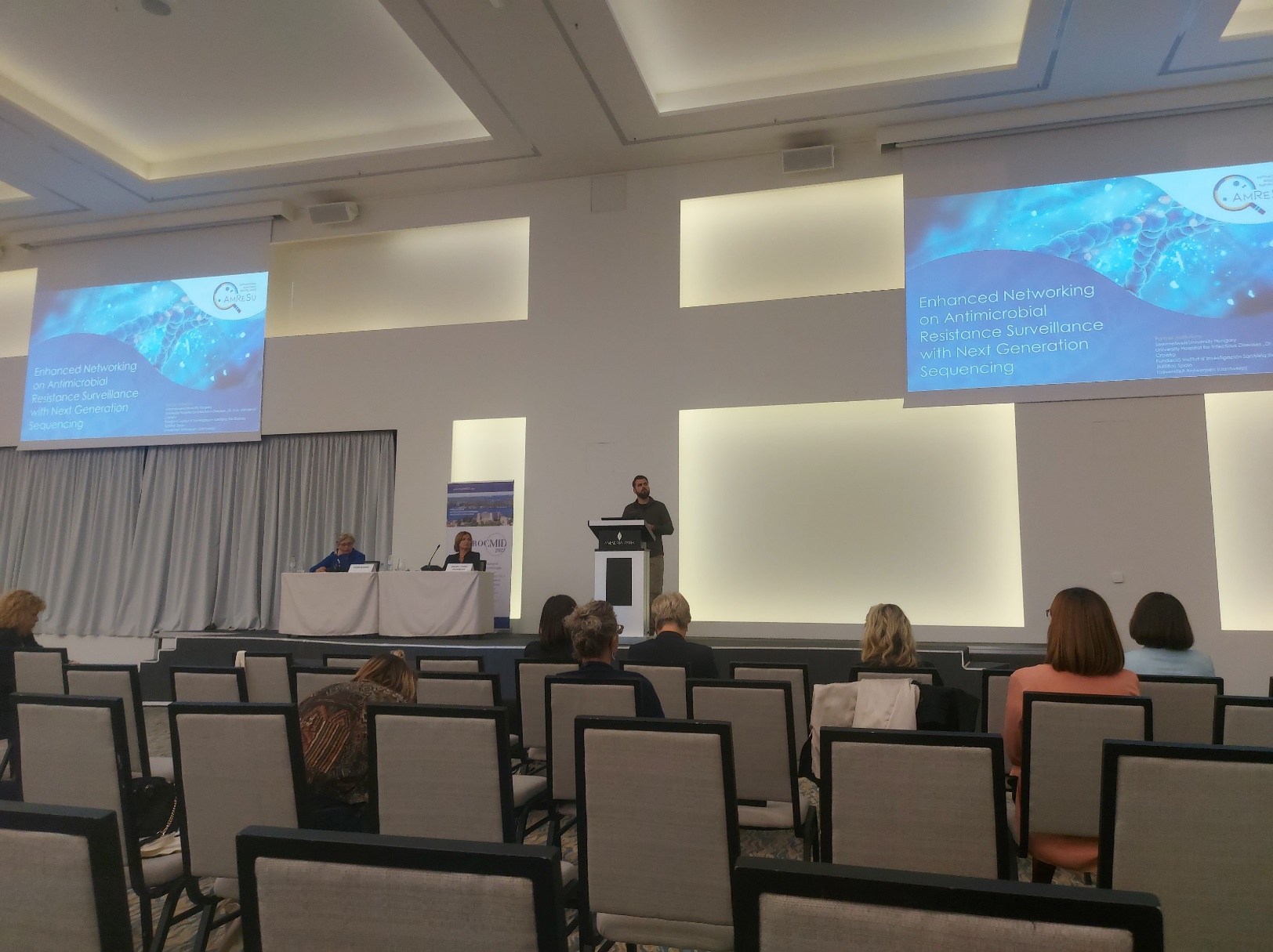
ESCMID PGEC Course and Croatian Congress of Clinical Microbiology and Infectious Diseases
19-21 October 202, 20-23 October 2022 in Sibenik, Croatia
In the October of 2022, the ESCMID Study Group on Antimicrobial Resistance Surveillance (ESGARS) and the Croatian Society for Clinical Microbiology jointly organized a course aiming to improve the use of diagnostic tools in settings with limited resources and high prevalence of antimicrobial resistance. This highly relevant topic attracted 43 participants from 23 countries and four continents. Many of them attended the course thanks to grants from either ESCMID or the Central Asian and European Surveillance of Antimicrobial Resistance (CAESAR) network.
Participants were grateful for the opportunity to enhance their daily routine while increasing the quality of data used for surveillance. They were encouraged to discuss the lectures in interactive tutorials during which theory was applied to support clinical and laboratory decision making in real-life situations. According to the participants’ feedback, case presentations during the tutorials were the best–liked part of the course. They also appreciated that the faculty members were available throughout the course and were happy to discuss their problems through both official and informal contacts.
Networking was another important topic that was highlighted throughout the course. The young researchers learned about the many networking opportunities that ESCMID offers, as well as international initiatives such as ECRAID and the AmReSu project (Horizon 2020). The Croatian AmReSu Lead, Arjana Tambić Andrašević was a course co-organizer and the University of Antwerp Lead AmReSu Lead, Surbhi Malhotra-Kumar was the invited speaker. Professor Surbhi Malhotra-Kumar gave a lecture on the highly relevant topic „Increasing capacity through twinning projects”. Six Croatian and two Hungarian young researchers of AmReSu project have been granted the project scholarship to attend the ESCMID PGEC Course and the Croatian Congress of Clinical Microbiology and Infectious Diseases in Šibenik, Croatia.
Quotes from the ESCMID PGEC Feedback questionnaire:
„It was inspiring that lecturers at the very beginning encouraged everyone to use this ESCMID course as an opportunity to network despite any language or social barriers. I was amazed how available (for small-talk, discussions, and exchange of recommendations, etc.) all faculty members were to us throughout these days. “
„The tutorials and case reports following the topics of lectures were amazing. It was also a great opportunity when we, as participants from these 23 countries, talked about them together and shared experiences to find the solutions in each case. The knowledge transfer worked perfectly!“
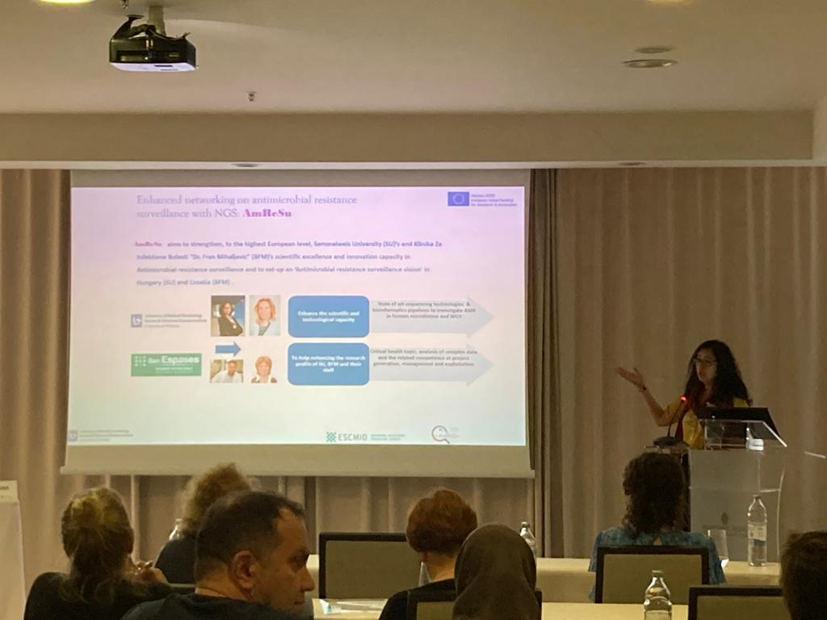
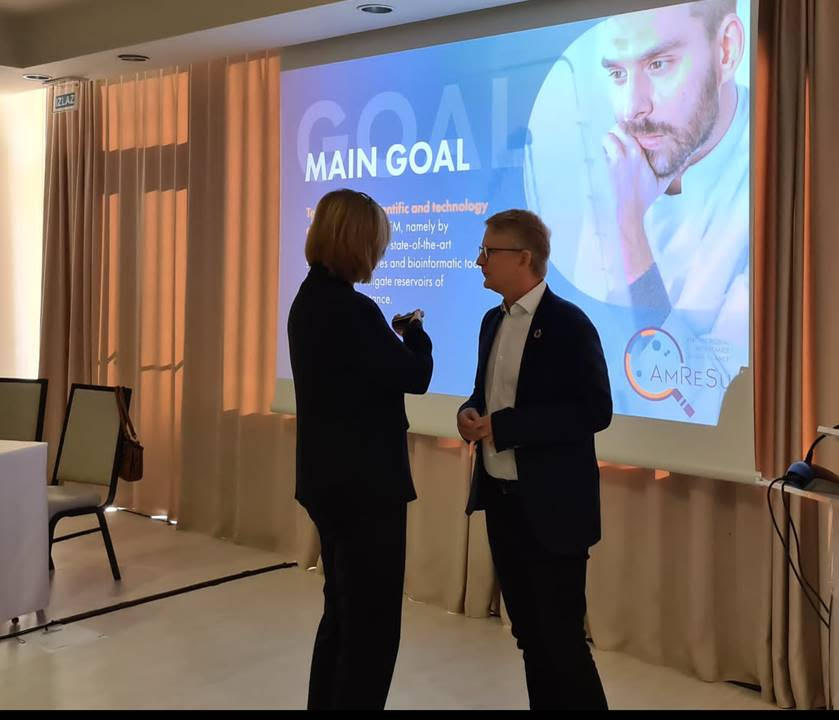
The get a glimpse of the course, check the video:
Further information on the Course: HERE
and the Congress: HERE
Two young researchers of SU attended AmReSu staff exchange program in Antwerp
Two young researchers Ms Judit Sahin-Toth and Mr Mate Gugolya of SU attended AmReSu staff exchange program in Antwerp between May 2nd to May 20th. After their return they presented the knowledge gained during the study visit to their colleagues.
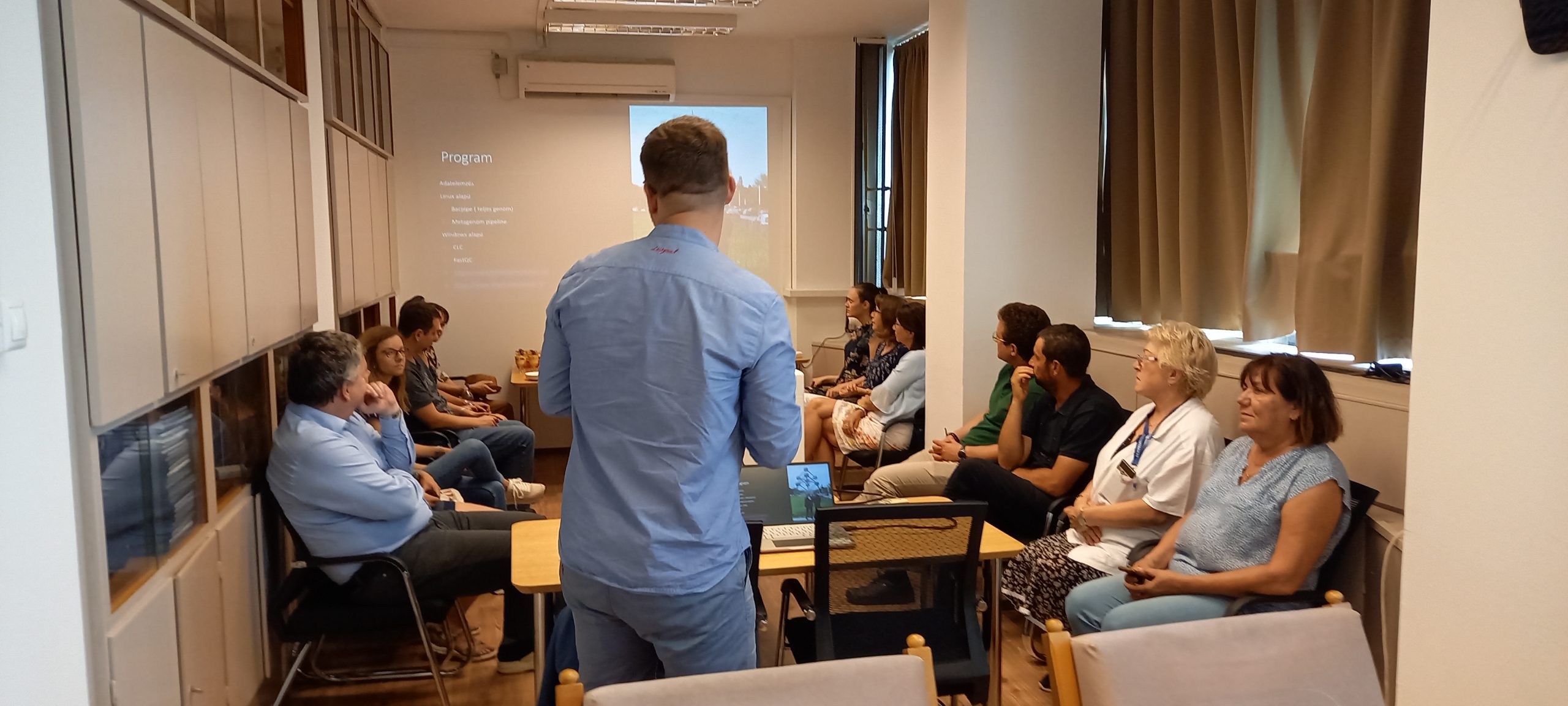 Mate gave a report to the Microbiome working group at the Microbiome lab meeting on June 27, 2022 at 11 a.m., and at the institute meeting on June 28, 2022.
Mate gave a report to the Microbiome working group at the Microbiome lab meeting on June 27, 2022 at 11 a.m., and at the institute meeting on June 28, 2022.
Training on Global-PPS in your hospital (22 and 24 March 2022)
Venue: online webinar
In March, UAntwerp will organize another virtual training on how to conduct the Global-PPS in a hospital.
Two similar webinars will be repeated on two different dates to accommodate different time zones.
The training will be given in English.
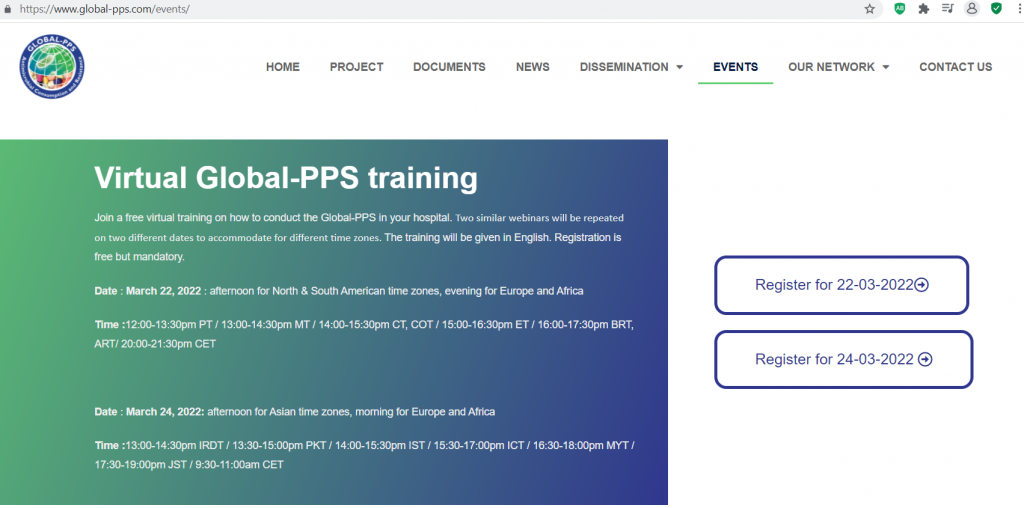
Generic project writing course
Generic project writing course
Date: 27/1/2022
Time: 9- 12 am
Venue: online webinar
Lead partner/provider: UAntwerp
As part of knowledge transfer within AmReSu, a specific training will be organized on pre-awarded and post awarded system on integrating expertise and project management to create new R&D Opportunities (planned activities and training).
The course will be given by dr. Bruno Hoste from the Grants Office, University of Antwerp.
Please find your personal link to the online session on Blackboard: https://eu.bbcollab.com/guest/daecb206c9e74639b2d1f73ce74fe0e1
You will be able to login 15 minutes before the start, thank you for being on time.
Please find the following instruction to participate on Blackboard via this link.
- Google Chrome
(Preferably) A headset with USB-connection in case you would like to ask questions during the Q&A.
Training course on Entrepreneurial skills: Introduction to Intellectual Property
DIVE-INTO-BUSINESS – BASICS, Intellectual Property (Part 1): The Fundamentals
Date: 12/1/2022
Time: 1- 4 pm
Venue: online webinar
Lead partner/provider: UAntwerp
Target Group: ZAP, Postdocs, Researchers, UAntwerp staff who want to collaborate with companies
Training given by: Steven Vermeir, Valorisation Office
Number of places: 80
Registration: please fill in the requested information’s and send it to valorisatie@uantwerpen.be and christine.lammens@uantwerpen.be
Last name:
First name:
Email:
Faculty:
Department/University:
This registration gives you access to the course. Once you register, you will receive a confirmation mail after registration. A link via BlackBoard of Uantwerp to attend the meeting online will be provided.
Doctorate programme at BFM
Date: from early 2022
One doctorate programme (Mr Josip Ujevic) at BFM, financed by this project, started in the early 2022 and the expected duration of the studies is three years. During that period, in order to obtain a PhD degree, the student must publish a doctoral thesis and a closely related scientific paper as a first author. Furthermore, to finish the doctoral studies, it is mandatory for the PhD student to participate in numerous workshops, seminars and conferences which brings also opportunities to further and broader disseminate the project communication materials and AmReSu’s results.
The topic of his thesis relates to epidemiology and mechanisms of antimicrobial resistance of Pseudomonas aeruginosa bacteria. The research, which would be performed as part of the preparation of the doctoral thesis, is planned to be conducted at the Department of Clinical Microbiology of the Clinic for Infectious Diseases “Dr. Fran Mihaljević ”. Invasive isolates of P. aeruginosa will be used as research material, collected over a period of four years. The primary aim of this study is to discover the determinants of resistance and virulence in clinical isolates of the bacterial species P. aeruginosa. In the collected isolates, susceptibility to antibiotics will be determined by phenotypic methods, disk diffusion method and determination of minimum inhibitory concentrations (MIC). Genotyping methods will be used to analyze molecular epidemiology, to determine the similarities between isolates and to identify sequence types (ST). In the group of sensitive and resistant isolates, representatives of ST types will be selected to determine the sequence of nucleotides of the complete genome by the next generation sequencing (NGS) method. Raw data, obtained by sequencing, will be analyzed using robust Bioinformatics tools. The main research focus of IdISBA also relates to resistome of P. aeruginosa. As a consequence, strengthening existing and new scientific collaborations between BFM and IdISBa is expected.
Expert visit from BFM to SU – dr. Irina Pristas, clinical microbiologist
Date: 14-15 October 2021
Place: Nagyvarad ter 4, Budapest 1089, Hungary
Conference: 6th Central European Forum for Microbiology
Date: 13-15 October 2021
Place: Hotel Aranyhomok, Kecskemet, Hungary and in parallel online
organized by the Hungarian Society for Microbiology, the Croatian Microbiological Society, the Slovenian Microbiological Society, and the Foundation of the Hungarian Society for Microbiology and held at Hotel Aranyhomok, Kecskemét, Hungary, between 13 – 15 October 2021. The CEFORM meetings traditionally attract participants from Austria, Croatia, the Czech Republic, Germany, Macedonia, Poland, Romania, Serbia and Montenegro, Slovakia, and Slovenia.
Due to the pandemic the event was held in a hybrid way this year. Hence, not only dr. Judit Sahin-Toth from Semmelweis University (SU) could attend the event, who personally gave a speech, but also our colleagues from the SU’s office alongside with our special guest dr. Irina Pristaš clinical microbiologist from the University Hospital for Infectious Diseases ‘Dr. Fran Mihaljević ‘ joined the event.
The program covered all major branches of microbiology, though, the main scientific topics this year were SARS-Cov-2 and Covid-19, presented by renowned experts of the field.
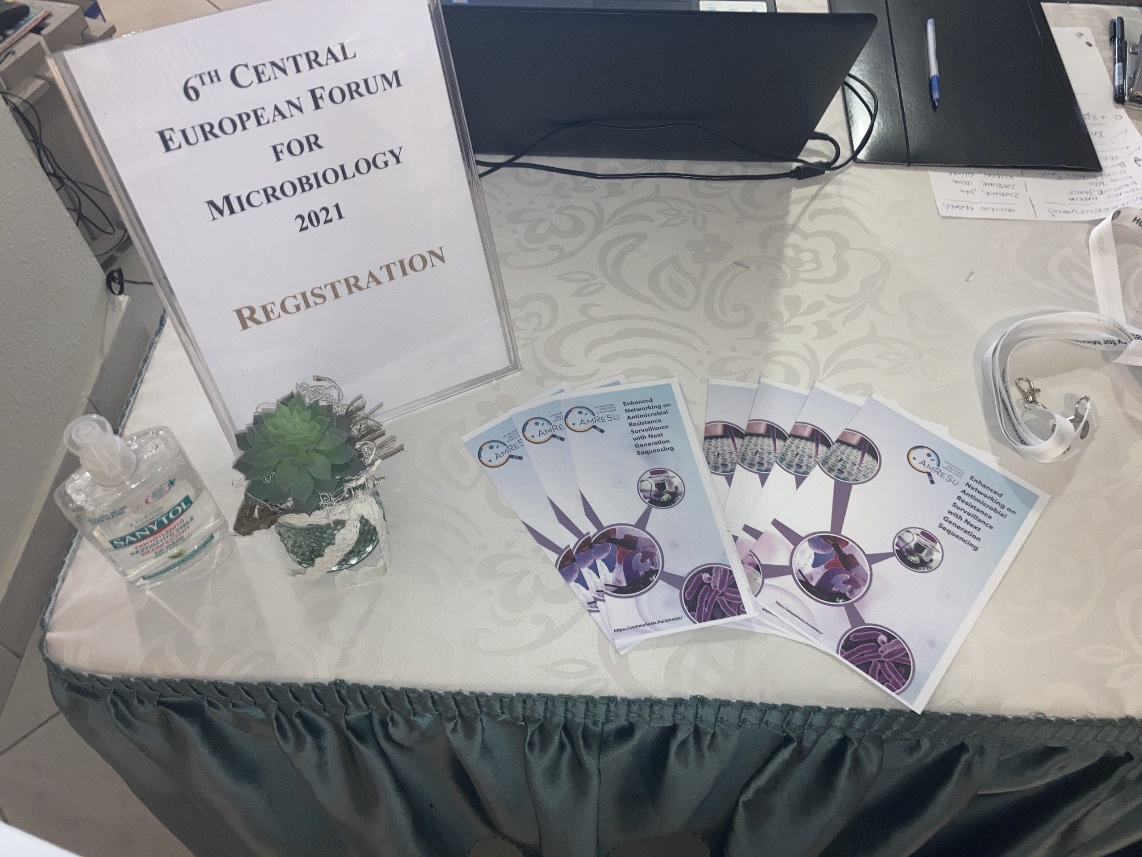
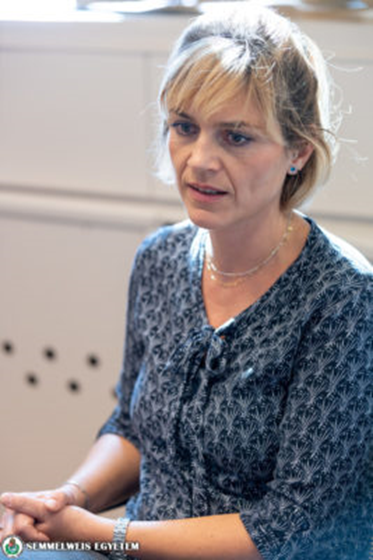
Further info: https://wecocongress.hu/aktualis-rendezvenyek/6th-central-european-forum-for-microbiology/
Conference: Interdisciplinary Section for Antibiotic Resistance Control (ISKRA)
Date: 14 July 2021
Venue: online conference
AmReSu project / Enhanced Networking on Antimicrobial Resistance Surveillance with Next Generation Sequencing will be introduced by Arjana Tambić Andrašević from BFM in this tematic online conference.
Conference: 10th Croation Symposium on Antibiotic Resistance
Date: 20-21 May 2021
Venue: online conference
The symposium is the central scientific event on antimicrobial resistance and it is being organized every thrid year. This year, due the COVID-19 pandemic, it is an on-line event and with more than 200 participants. Number of speakers (national and international) will be around 30.
One part of the program will be completely dedicated to AmReSu project. Powerpoint presentations to held by S. Malhota-Kumar (https://www.youtube.com/watch?v=EofL1DPSSIg) and B. Xavier (https://www.youtube.com/watch?v=sRN5-hrOL8g) on the topic of whole genome seqencing and its role in clinical microbiology.
Virtual workshop organised by UAntwerp in WP3: Session 1
Application of using short and long-read sequencing technologies and the related bioinformatics tools
Date: 9 April 2021
Hour: 13:00h – 15:00h
Teams meeting
Aim: Review of sequencing technologies, instrumentation, bioinformatics tools as of today
Documentation to be considered in preparation for the meeting:
- Frontiers | Using Genomics to Track Global Antimicrobial Resistance | Public Health (frontiersin.org)
- Consolidating and Exploring Antibiotic Resistance Gene Data Resources | Journal of Clinical Microbiology (asm.org)
Get yourself familiar with AmReSu – here you are our promotional materials!
Our brochures:
Staff exchange hosted by IdISBa in WP4
Date: 1-30 May 2021
Place: FUNDACIÓ INSTITUT D’INVESTIGACIÓ SANITÀRIA ILLES BALEARS (IdISBa) Carretera de Valldemossa, nº 79 Hospital Universitario Son Espases., Edificio S 07120 Palma – Mallorca (Illes Balears)
As part of the planned staff-exchanges, two PhD students from SU and one from BFM, without previous knowledge on next-generation sequencing and bioinformatics, will personally visit IdISBa for four weeks during May 2021. The activities to be carried out are explained week by week at the Activity Plan Description.
Activity Plan Description
1st week: DRY-LAB
- Introduction to WGS: genomics and bioinformatics.
- Starter with Ubuntu.
- Hands-on “Bacterial typing and antibiotic acquired resistance determinants detection”.
- Hands-on “Phylogenetic reconstruction: Core-genome and Minimum Spanning trees”.
2nd week: DRY-LAB
- Hands-on “Mutation-driven resistance in P. aeruginosa: variant calling analysis”.
- Hands-on “De novo assemblies”.
- Hands-on “Plasmid analysis in Enterobacteriaceae”.
3rd week: WET LAB
- Laboratory session “Illumina Library Preparation”.
4th week: DRY-LAB
- In order to consolidate the acquired skills during the previous weeks, SU and BFM members will perform different bioinformatics analysis in their own sequences.
Virtual workshop by UAntwerp in WP3: Session 3
Date: Monday, May 10th
Hour: 13:00h – 15:00h
Outcome of practical exercise (data analysis):
WGS technology as a unique platform for antibiotic resistance gene investigation of clinical important pathogens
Teams meeting
Aim: To review the outcome of the exercise
Documentation to be considered in preparation for the meeting:
In preparation for the meeting: Provide the results of the exercise to basilbritto.xavier@uantwerpen.be
Virtual workshop by UAntwerp in WP3: Session 2
Demonstration of WGS bioinformatic tools
Date: Monday, April 26th
Hour: 13:00h – 16:00h
Teams meeting/skype
Aim: To have the most frequently used bioinformatic tools explained and demonstrated using the in-house build pipeline BacPipe.
Documentation to be considered in preparation for the meeting:
- BacPipe: A rapid, user-friendly whole-genome sequencing pipeline for clinical diagnostic bacteriology. Xavier, BB. et al. In: iScience, Vol. 23, No. 100769, 100767, 09.12.2019, p. 1-28.
- Link to BacPipe tutorial: GitHub – wholeGenomeSequencingAnalysisPipeline/BacPipe